
SUBIACO REACHES OUT: Perth parish adopts, backs man’s initiative VISTA 4


Thursday April , Perth, Western Australia ● $1 Western Australia’s Award-winning Catholic newspaper
TAG TEAMS: Youth ministry doorknocks to invite lapsed back VISTA 1
FIRST MESSAGE: What Benedict said the day after being elected Page 12
Pontificate begins
Pope will rely on prayers from us
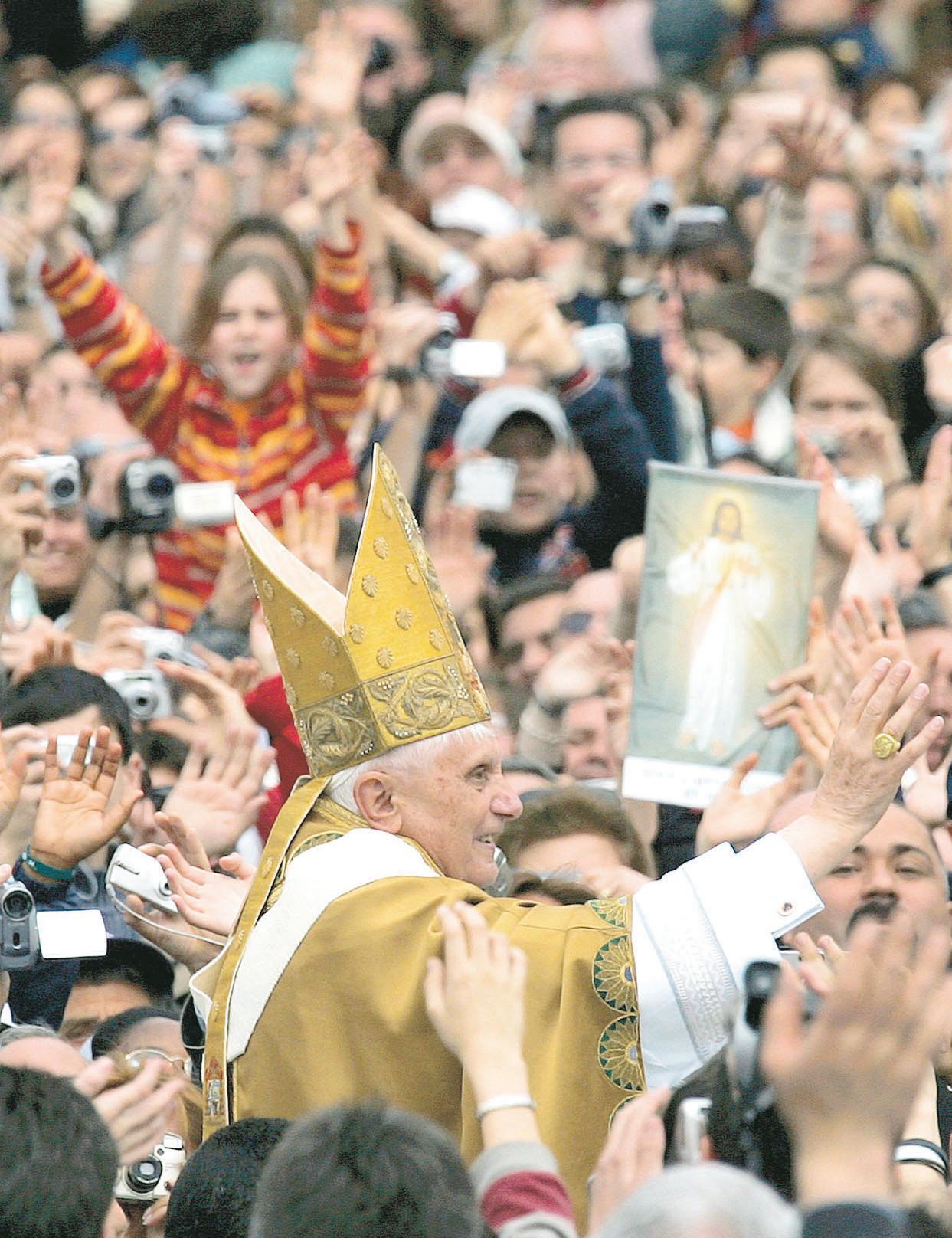
CITIZEN OF THE WORLD
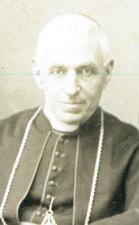 ■ By Cindy Wooden of CNS, in Rome
■ By Cindy Wooden of CNS, in Rome
In a liturgy rich with symbols and promises, Pope Benedict XVI formally began his ministry as head of the universal Church, and Catholics from around the world pledged their love and obedience to him.
On the morning of April 24, Pope Benedict, elected on April 19, walked down to the tomb of the martyred St Peter in the Vatican basilica to pay homage to the first bishop of Rome.
Then, with some 150 cardinals, he processed into a sun-bathed St Peter’s Square to begin the Mass and receive the main symbols of his office: the fisherman’s ring and the pallium.
“At this moment, weak servant of God that I am, I must assume this enormous task, which truly exceeds all human capacity,” Pope Benedict said in his homily.
The 78-year-old Pope said he would rely on the prayers of all Catholics and the grace of God.
“I do not have to carry alone what in truth I could never carry alone,” he said.
The new Pope said his inaugural Mass was not the moment to present “a program of governance,” but rather a time to promise to try be a good shepherd to Christ’s flock, to rescue those who are lost, to help the poor and to build unity among all believers in Christ.
An estimated 350,000 people attended the Mass, including delegations from more than 130 countries and from dozens of Orthodox, Anglican and Protestant churches.
The German-born Pope’s 81-year old brother, Father Georg Ratzinger, was seated in the front
Continued on page 2
Perth bishops to consult youth
■ By Hugh Ryan
Archbishop Barry Hickey and Auxiliary Bishop Don Sproxton will conduct a major consulation with young people in the Archdiocese during May.
The Archbishop announced this week that between 60 and 70 young people (aged under 40) would be invited to attend two and possibly three evenings during which they would give advice to their Bishops.
The young people would be nominated by youth groups, ethnic groups, education, people with disabilities, seminarians, seven of the larger parishes, and the Respect Life Office.
Continued on page 10
BENEDICTINES ARE BACK
The appointment of a priest from Ner Norcia to Dardanup in the Diocese of Bunbury re-opens a chapter commenced in the mid-nineteenth Century.
5
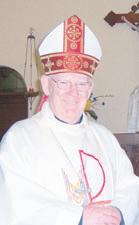
soon to be on the Web
The Parish. The Nation. The World.
pioneering Italian Bishop was suspected by many and even fell foul of the Vatican, but was later recognised as a guiding light for migrants and those who assist them.
A
2-3
VISTA
INDEX Parents as role models: It’s You! - Page 7 The ABC wins our award for bigotry - Page 7 Guy Crouchback: Only Rome could pull this off - Page 7 Chinses bishop’s death reveals divide - Page 9
Page
Benedict XVI waves to the crowd following his inaugural Mass blessing people with his right hand, newly weighted by the fisherman’s ring.
Photo: CNS
Continued from page 1
row by the altar, not far from German Chancellor Gerhard Schroeder and President Horst Koehler.
The crowd was dotted by faithful waving flags, especially German flags.
Italian President Carlo Azeglio Ciampi, King Juan Carlos of Spain and Britain’s Prince Philip were seated alongside the altar.
Israel was represented by its ambassador to the Vatican. Sixteen Orthodox churches sent representatives even though April 24 was Palm Sunday on the Julian calendar most of them follow.
Chilean Cardinal Jorge Medina Estevez placed the pallium, a long woollen stole, around the neck of Pope Benedict, reminding him that Jesus has entrusted him with taking up the ministry of St Peter to shepherd Christ’s flock.
“The Pope is the Pope,” he said. “I’m happy with it. I hope God will guide him. We feel blessed to be here, to be as one: no racism, no nothing.”
Italian Cardinal Angelo Sodano, Vatican secretary of state, handed Pope Benedict the fisherman’s ring, which the new Pope placed on the ring finger of his right hand.
Cardinal Sodano prayed that “the Spirit of love” would fill the new Pope with the strength and meekness needed to minister to Christians “in the unity of communion.”
In his homily, Pope Benedict said, “One of the basic characteristics of a shepherd must be to love the people entrusted to him, even as he loves Christ whom he serves.”
“Loving means giving the sheep what is truly good, the nourishment of God’s truth, of God’s word, the nourishment of his presence which he gives us in the Blessed Sacrament,” he said.
The new Pope asked for the prayers of the entire Church that he would grow in his love for the Lord and for the members of the Church and prayers that he would be strong in the face of those who threaten the Church. “Let us pray for one another, that the Lord will carry us and that we will learn to carry one another,” he said. His homily repeatedly was interrupted by applause, and Pope Benedict received a long ovation when he finished.
After he received the symbols of his office, Pope Benedict received the act of obedience of his new flock, symbolised by 12 people from eight countries.
Bishop Andrea Erba of VelletriSegni, who represented diocesan bishops, leads the diocese of which the former Cardinal Joseph Ratzinger was titular head while serving as dean of the College of Cardinals. Father Enrico Pomili, representing all priests, is pastor of the Rome parish of Santa Maria Consolatrice, Cardinal Ratzinger’s titular church until he became dean of the college in 2002. The others included a transitional deacon from Africa; a Discalced Carmelite priest who serves as a consultant to the Congregation for the Doctrine of the Faith; a Benedictine abbess; a
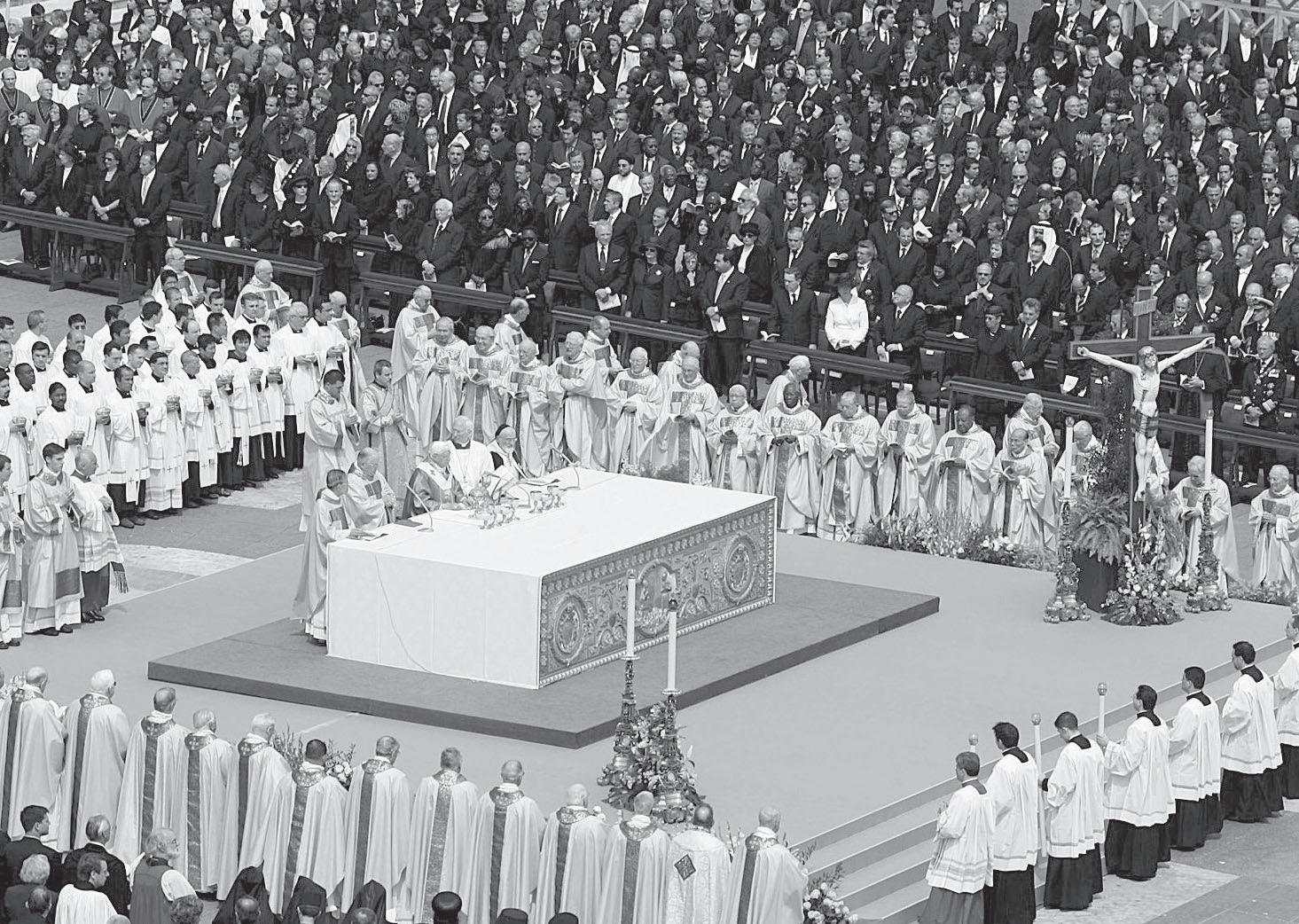
Korean married couple; a young woman from Sri Lanka; and a young man from Congo.
Italian Cardinal Angelo Sodano, South Korean Cardinal Stephen Kim Sou-hwan and Cardinal Medina represented the College of Cardinals. Among the thousands of people who gathered in St Peter’s Square and filled the surrounding streets for the Mass were many who felt represented by the 12.
Francisco Navarro, 36, of Los Angeles said he was not disappointed the world’s cardinals chose a German instead of a Spanish or Latin American Pope. “The Pope is the Pope,” he said. “I’m happy with it. I hope God will guide him. We feel blessed to be here, to be as one: no racism, no nothing.”
more proud where he is from, in Bavaria.” Keller said that in general: “Germans are very critical. They are waiting to see what he is like because he seems to be very conservative.” While the Gospel was chanted in Latin and Greek, the other Bible readings were in English and Spanish. The prayers of the faithful were recited in German, French, Arabic, Chinese and Portuguese. In French, the people prayed: “For our Holy Father Benedict XVI, who today begins his ministry as the Roman pontiff, may he serve the Church and be a courageous witness of the Gospel.”
Benedict smiled broadly, listened attentively, stroked the cheeks of the young and offered his blessing.
At the end of the Mass, Pope Benedict took his first ride in the Popemobile, standing in the back of the open vehicle, waving to the crowd and blessing them with his right hand, newly weighted by the fisherman’s ring.
He then went into St. Peter’s Basilica where a chair was set on an oriental rug before the main altar. Members of the government delegations were led into the basilica to greet him and pose for photographs.
Subscriptions
Eugene Suares administration@therecord.com.au
Advertising
Chris Mizen advertising@therecord.com.au
587
The
Tel:
Fax:
Journalists
Jamie O'Brien jamieob@therecord.com.au
Bronwen Clune clune@therecord.com.au
Mark Reidy reidyrec@iinet.net.au
Production
Petra Keller, 36, who is German but lives in Rome, said: “We are proud, yes, but Germans generally are never proud of their country because of their history. They are
The bread and wine consecrated by Pope Benedict during the Mass were brought up to him by Catholics from Hungary, Croatia, Kenya, Burkina Faso, Italy, China and Peru; many in the procession wore their national costumes.
During the offertory procession and the act of obedience, Pope
Pope Benedict was to meet on April 25 with the delegations from the other Christian churches and from other religions. A separate audience was planned for Catholic pilgrims from Germany.
Contributing to this story were Benedicta Cipolla and Eleni Dimmler. - CNS




Page 2 April 28 2005, The Record
to contact The Record
to the Editor
How
Letters
cathrec@iinet.net.au
and Accounts
Record
Newcastle St, Leederville WA 6902 PO Box 75 Leederville, WA 6902
(08) 9227
7080
(08) 9227 7087
Derek Boylen production@therecord.com.au
Rosengren CRUISING • FLIGHTS • TOURS Live your travel dream Personal service and experience will realise your dream Live your travel dream ® A division of Interworld Travel Pty Ltd Lic No.9TA796 Est 1981 200 ST.GEORGE’S TERRACE,PERTH,WA 6000 TEL 61+8+9322 2914 FAX 61+8+9322 2915 email:admin@flightworld.com.au www.flightworld.com.au Michael Deering Enquire about our Cashback Offer* * Conditions apply MANNING & ASSOCIATES OPTOMETRISTS Contact Lens Consultants Mark Kalnenas (B. optom) Grove Plaza, Cottesloe 9384 6720 Why not stay at STORMANSTON HOUSE 27 McLaren Street, North Sydney Restful & secure accommodation operated by the Sisters of Mercy, North Sydney. • Situated in the heart of North Sydney and short distance to the city • Rooms available with ensuite facility • Continental breakfast, tea/coffee making facilities & television • Separate lounge/dining room, kitchen & laundry • Private off-street parking Contact: Phone: 0418 650 661 or email: nsstorm@tpg.com.au VISITING SYDNEY A LIFE OF PRAYER ... are you called to the Benedictine life of divine praise and eucharistic prayer for the Church? Contact the: Rev Mother Cyril, OSB, Tyburn Priory, 325 Garfield Road, Riverstone, NSW 2765 www.tyburnconvent.org.uk TYBURN NUNS 350,000 attend opening papal Mass
Editor P.
Pope Benedict XVI celebrates his inaugural Mass on April 24 in St Peter’s Square.
The Parish. The Nation. The World.
Photo: CNS
Pope emphasises escaping absence of values
■ By John Thavis
In the first homily of his papacy, Pope Benedict XVI said his primary mission was to lead people out of the modern desert of empty values, alienation and injustice toward the light of Christ.
Speaking on April 24 to some 350,000 people who spilled out of St Peter’s Square, the Pope said he took seriously the charge Christ gave to St Peter, the first Pope: “Feed my sheep.”
That means loving the flock and giving them “what is truly good, the nourishment of God’s truth, of God’s word, the nourishment of his presence,” he said.
“The Church is alive” was Pope Benedict’s refrain in a talk interrupted more than 30 times by applause. The 35-minute sermon, broadcast to countries around the world, focused on the essentials of the Church’s mission and the role of the Pope.
Pope Benedict said his inaugural Mass was not the moment to present a detailed plan or program for his pontificate.
“My real program of governance is not to do my own will, not to pursue my own ideas, but to listen, together with the whole Church, to the word and the will of the Lord, to be guided by him, so that he himself will lead the Church at this hour of our history,” he said.
Instead, the Pope’s homily concentrated on two symbols of the investiture ceremony: the pallium, the stole that signifies the shepherd’s mission, and the fisherman’s ring, which represents the Pope’s role as a “fisher of men.”
The Pope said the lamb’s wool of the pallium is meant to represent the lost, sick or weak sheep which the shepherd places on his shoulders and leads to “the waters of life.” That has special meaning today, he said.
“The human race - every one of us - is the sheep lost in the desert which no longer knows the way,” he said. “The son of God will not let this happen; he cannot abandon humanity in so wretched a condition.” Likewise, he said, the pastor cannot be indifferent that “so many people are living in the desert.”
“And there are so many kinds of desert. There is the desert of poverty, the desert of hunger and thirst, the desert of abandonment, of loneliness, of destroyed love. There is the desert of God’s darkness, the emptiness of souls no longer aware of their dignity or the goal of human life,” he said.
“The external deserts in the world are growing, because the internal deserts have become so vast. Therefore the earth’s treasures no longer serve to build God’s garden for all to live in, but they have been made to serve the powers of exploitation and destruction,” he said.
He said the Church’s mission must be to “lead people out of the desert, toward the place of life, toward friendship with the Son of God, toward the one who gives us life, and life in abundance.”
The Pope said the role of shepherd in the Church should not be confused with the kind of authority
once wielded by kings over their people.
“It is not power, but love that redeems us,” he said.
Pope Benedict acknowledged the doubts many people feel when they look at evil in the world and wonder where God has gone.
“How often we wish that God would show himself stronger, that he would strike decisively, defeating evil and creating a better world,” he said.
But he cautioned that this was the reasoning used by “ideologies of power,” which justify the destruction of “whatever would stand in the way of progress and the liberation of humanity.”
The Church’s way is patience, he said.
“We suffer on account of God’s patience. And yet, we need his patience,” he said. “The world is redeemed by the patience of God. It is destroyed by the impatience of man.”
The Pope then explained the significance of the second symbol, the fisherman’s ring, which he wore on his right hand. He said it underlined the Church’s duty to “put out to the deep sea of history and to let down the nets, so as to win men and women over to the Gospel.”
Here, too, he said, the Church responds to a deep need of the contemporary world.
“It is really true: As we follow Christ in this mission to be fishers of men, we must bring men and women out of the sea that is salted with so many forms of alienation and onto the land of life, into the light of God. It is really so: The purpose of our lives is to reveal God to men,” he said.
Pope Benedict said the shepherd and the fisherman are unity figures. Referring to the split between Christian churches, he said: “Lord, remember your promise. Grant that we may be one flock and one shepherd.”
The Pope drew applause when he spoke about the sense of loss felt by the whole Church with the death of Pope John Paul II and his own trepidation about serving as his successor.
“How alone we all felt after the passing of John Paul II,” he said.
But he said the Church knew that the late Pope was not alone - that he
Bound for WYD 05?
Benedict XVI’s first international trip might well be to his native Germany, for World Youth Day this August in Cologne.
It was the only trip that remained in the agenda of John Paul II, who convoked the event after World Youth Day in Toronto in July 2002.
In the first message of his pontificate, the new Pontiff greeted young people in particular, “privileged interlocutors of Pope John Paul II,” and directed to them his “affectionate embrace while waiting, God willing, to meet them in Cologne.”
The trip to Cologne on John Paul II’s agenda was to take place from August 18-21.
Cardinal Joachim Meisner, Archbishop of Cologne, revealed that Benedict XVI was no sooner elected than he confirmed his intention to attend World Youth Day. - Zenit
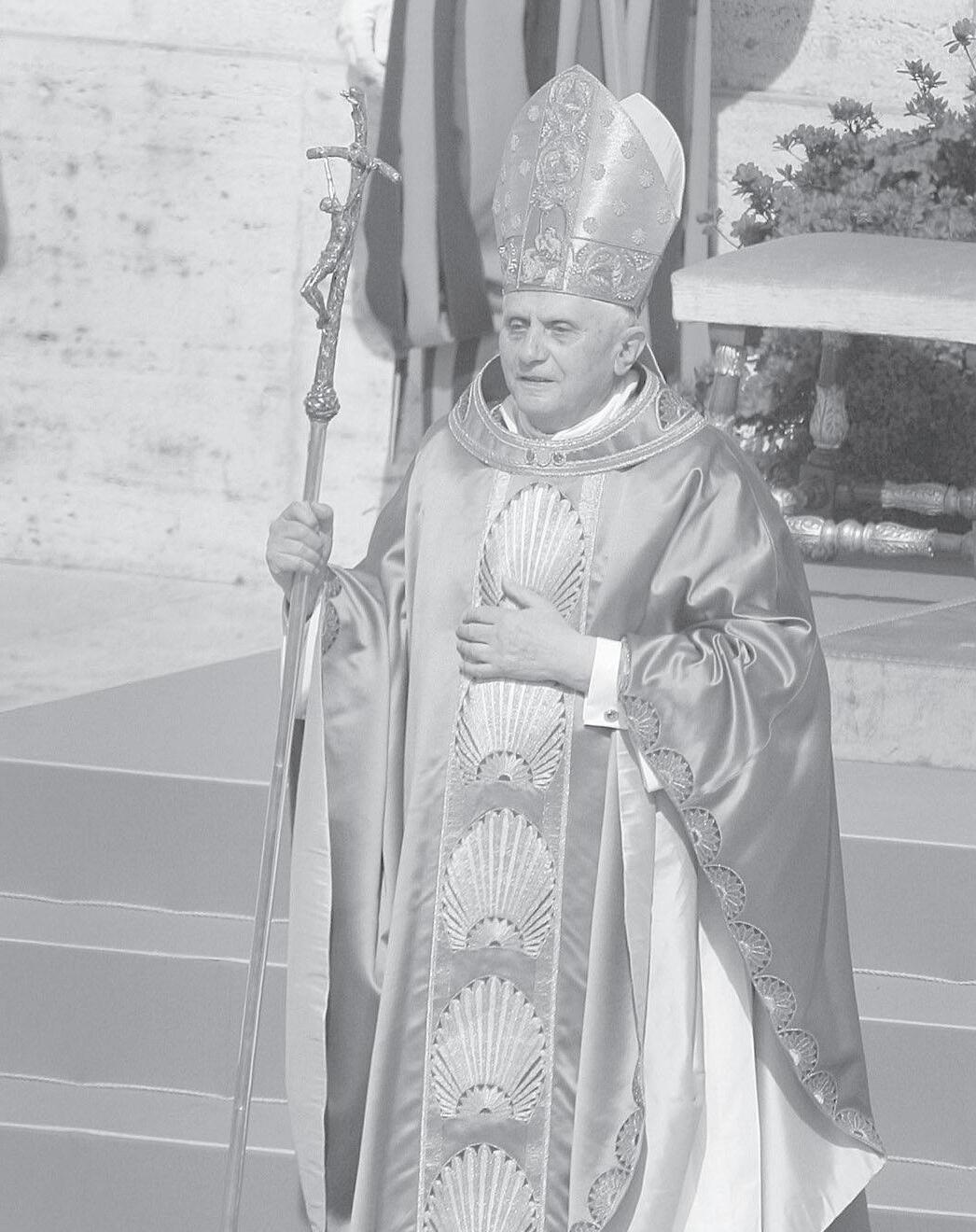
was in the company of saints and is “truly at home.”
“And now, at this moment, weak servant of God that I am, I must assume this enormous task, which truly exceeds all human capacity. How can I do this? How will I be able to do it?” the Pope said. His words were met by a burst of applause from the crowd.
The Pope said he was certain that he would not be alone. He told the crowd that he would feel sustained by all the saints “and by your prayers, my dear friends, by your indulgence, your love, your faith and your hope.”
The Pope drew huge applause when he said the experience of Pope John Paul’s illness and death had reminded everyone that “the Church is alive. And the Church is young.”
“She holds within herself the future of the world and therefore shows each of us the way toward the future,” he said.
The Pope closed his sermon by evoking the words of his predecessor at his inaugural Mass more than 26 years ago: “Do not be afraid!”
He said he would preach the same words, especially to the young. In a raised voice he said:
“And so, today, with great strength and great conviction, on the basis of long personal experience of life, I say to you, dear young people: Do not be afraid of Christ! He takes nothing away, and he gives you everything.” - CNS

Property Management Service
For honest, reliable service and care of your investment property.
Contact (08) 9459 3600 or email Trish Humphries at trish@ppre.net
www.ppre.net
CATHOLIC MARRIAGE EDUCATION SERVICES ENTHUSIASTIC MEN AND WOMEN ARE REQUIRED TO TRAIN AND WORK AS CASUAL MARRIAGE EDUCATORS
Catholic Marriage Education Services is the Archdiocesan Agency mandated to prepare couples for marriage and provide ongoing marriage education programs.
Individuals with an interest in marriage education are encouraged to apply for training with the view to future employment on a casual basis at the agency.
Qualifications in a relevant field would be an advantage. The training program is flexible and individualised and will take into consideration previous qualifications and experience.
A position description and application form can be obtained by ringing Christina or Elsa on 9325 1859 Tues, Wed or Thurs.
Closing date for applications is 13th May 2005
April 28 2005, The Record Page 3
In his homily, the pope said the first public Mass of his papacy was not a time to present “a program of governance,” but a time to promise to try be a good shepherd to Christ’s flock.
Photo: CNS
Do new rites signal a new approach?
■ By Cindy Wooden
With Pope Benedict XVI’s first public Mass, the Vatican inaugurated new rites, rituals and vestments.
Developed during the pontificate of Pope John Paul II, the changes were kept as drafts until Pope Benedict approved them the day after his April 19 election, said Mgr Crispino Valenziano, a consultant to the office of papal liturgical ceremonies.
When asked if Pope Benedict had requested any changes to the liturgies, the monsignor said, “No comment.”
However, he said, Pope Benedict’s reaction to the rites as a whole was that they express “all of ecclesiology,” providing a tangible expression of what the Catholic Church believes about itself.
Mgr Valenziano said the revised “Rites for the Beginning of a Pontificate” represent the first systematic and formal reworking of the rites since the Second Vatican Council.
Pope Paul VI began his pontificate with the traditional coronation, although later he dispensed with the tiara. The inaugurations of Popes John Paul I and John Paul II were simplifications of the old coronation ceremony, Mgr Valenziano said.
The biggest visual changes in the new rites, he said, are the fisherman’s ring and the pallium, the woolen stole symbolizing a bishop’s authority.
Both, he said, are based on ancient designs.
The fisherman’s gold ring, incised with a scene of St Peter casting out his net, is similar to the old rings that popes used also as seals. Designed by the Rome Association of Goldsmiths, it does not have a gem in it, Mgr Valenziano said.
Pope Benedict’s pallium is similar to that worn by Popes in the first millennium, he said.
Pope John Paul’s pallium was a circular band worn over the shoulder with a 12-inch long strip hanging down the front and the back.
The new pallium wraps around the Pope’s shoulders and hangs down his left side just below his knees. The end piece is made of black silk, a symbol of “the black sheep which the shepherd rescues and carries over his shoulder back to the flock,” Mgr Valenziano said.
Two major changes were made to the installation Mass, celebrated on April 24 at the Vatican.
The service began inside St Peter’s Basilica with all the concelebrating cardinals forming a circle around the main altar.Pope Benedict and the patriarchs of the Eastern Catholic Churches went down to St Peter’s tomb under the altar, paying their tribute to the apostle.
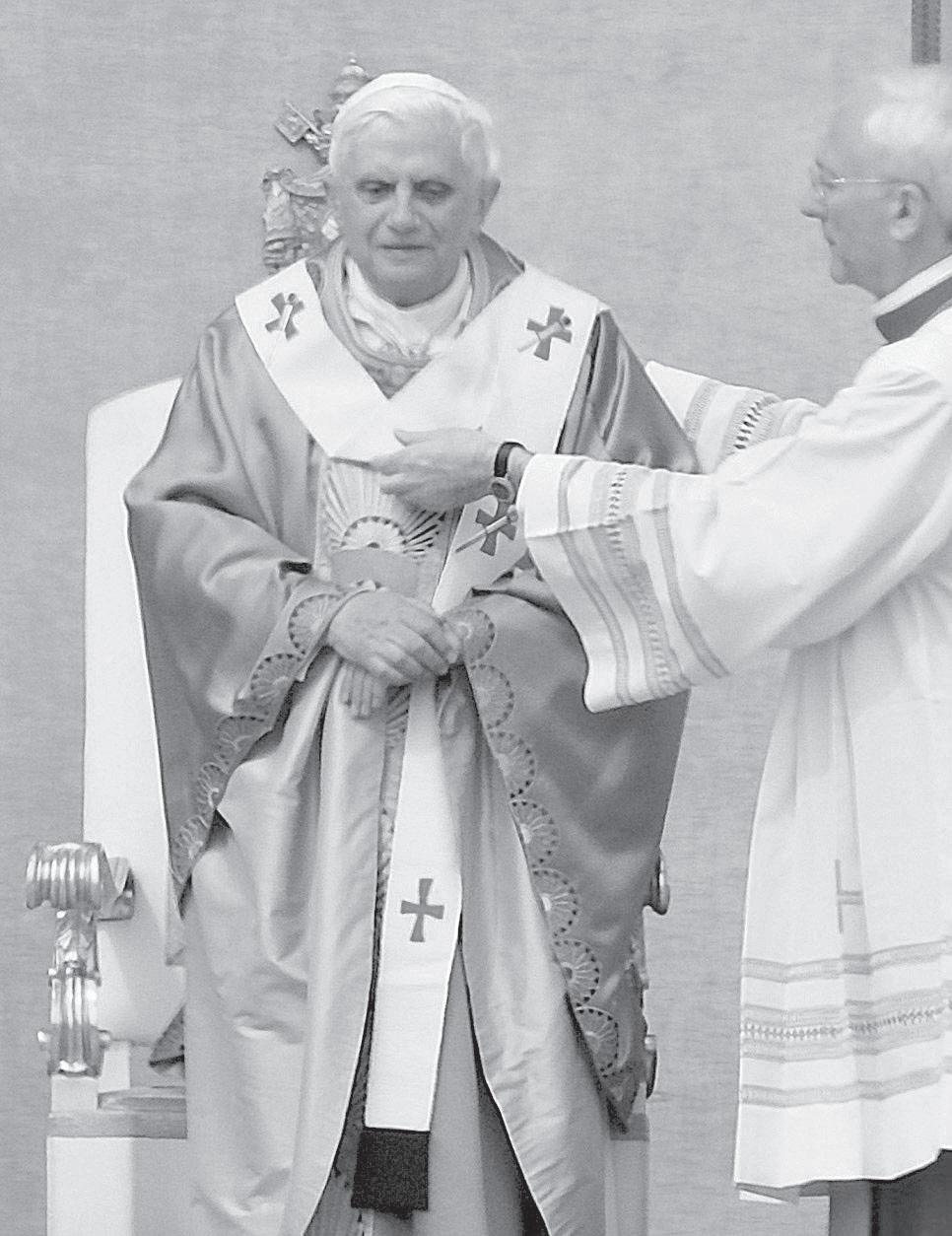
“Places are especially important,” Mgr Valenziano said. “Although the Basilica of St John Lateran is his cathedral, the ministry of the pope begins at St Peter’s because he is the successor of St Peter.”
By walking into the square from the apostle’s tomb, the monsignor said, the new Pope tells the world, “I begin my ministry from the place where the apostle’s ended.”
The second change involved the act of obedience, which in the past was made by every cardinal present at a papal inauguration.
The new rite was designed to demonstrate that the entire Church recognises the newly elected pope, Mgr Valenziano said.
Twelve people were chosen to represent all Catholics: three cardinals, a bishop, a diocesan priest, a transitional deacon, a male religious, a female religious, a married couple and a young man and a young woman recently confirmed.
Mgr Valenziano said the new rites also
call for the Pope to go almost immediately to the Basilica of St Paul’s Outside the Walls to pay homage to the other martyr considered co-founder of the church of Rome.
Pope Benedict visited the basilica on Monday this week.
The next major liturgies, which probably will take place on May 7, were to be focused on the Diocese of Rome, which the Pope heads. He will take possession of his cathedral, St John Lateran, but also will be reminded of what the early fathers of the church said about the role of bishop, Mgr Valenziano said. Cardinal Camillo Ruini, papal vicar of Rome, will remind Pope Benedict that “you are elevated to watch over us, not because you are superior to us,” that “your honour is true only if you do not obscure the honour of your brothers and sisters,” and that his role is to be “the servant of the servants of God.”
- CNS
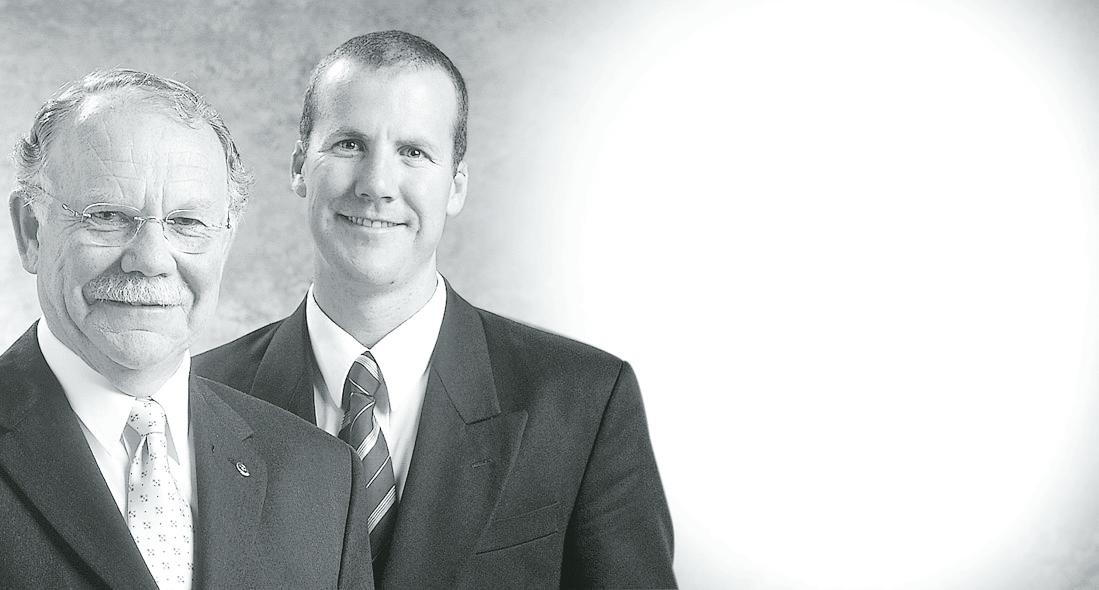
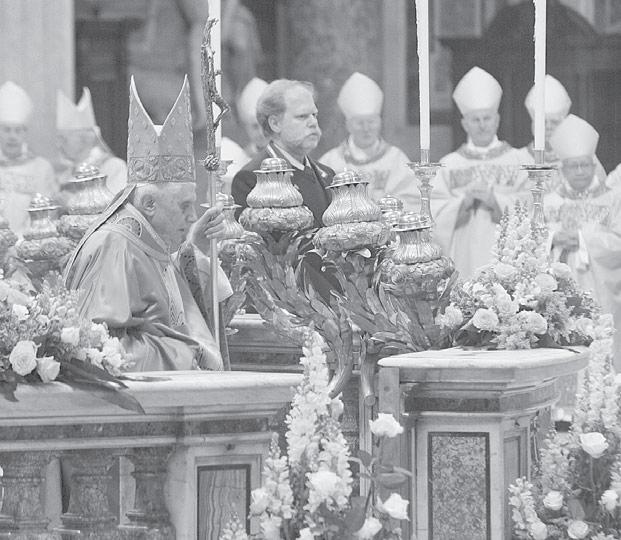
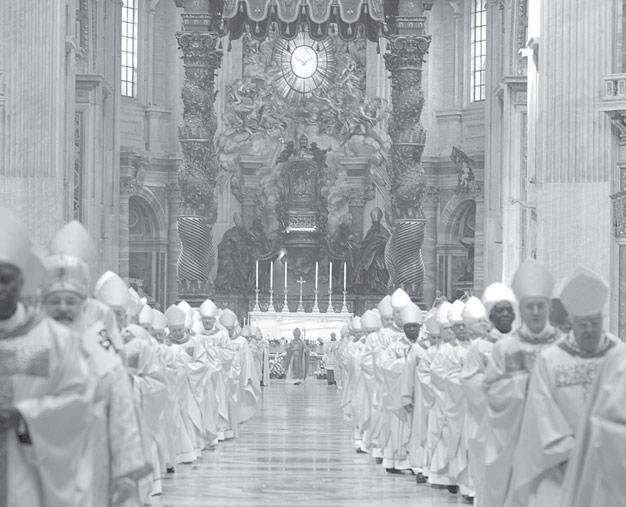
Anglican Archbishop Williams encouraged by Benedict’s commitment to Christian unity
The spiritual leader of the worldwide Anglican Communion said he is encouraged by Pope Benedict XVI’s commitment to Christian unity and believes his papacy will give special energy to a “united Christian witness” in an increasingly secularised Europe.
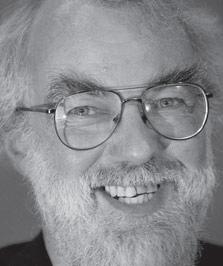
Anglican Archbishop Rowan Williams of Canterbury, the only head of a Church present for Pope Benedict’s installation and his April 25 meeting with ecumenical representatives, spoke with reporters afterward.
Archbishop Williams said, “it was not possible to speak in any great depth, but the Pope and myself were able to exchange a few words and promised to pray for each other.”
The Archbishop said he was encouraged by the fact that in the first days following his election “Pope Benedict has gone out of his way to underline the sense of priority of ecumenical work. He has spoken of the service of unity, and we have taken that very much to heart.” The Anglican leader told reporters Pope Benedict has repeatedly expressed his commitment to ecumenism since his April 19 election, “so we look forward in hope and sympathetic interest to how this very fruitful dialogue ... is to be pursued.”
English Cardinal Cormac Murphy-O’Connor of Westminster, who joined Archbishop Williams at the press conference, said Pope Benedict XVI had made it very clear since his election that “there is no going back” on the Catholic Church’s commitment to Christian unity, and he has given “his own imprimatur” on ecumenism.
“Someone said our God is a God of surprises, and who knows, Pope Benedict, too, may be a Pope of surprises,” the Cardinal said.
Archbishop Williams said he also was pleased about the new Pope’s emphasis on “the theme of united Christian witness.” - CNS
Page 4 April 28 2005, The Record Julian, a fourth generation funeral director, will spend more time with you taking care of every detail. So you can put your trust in the service, understanding and gentle compassion of an Oakwood Funeral. Speak to Julian or his father Don to arrange a funeral or discuss your pre-paid options. Anew standard of service and a lifetime of tradition. 506 Marmion Street BOORAGOON Telephone (08) 9330 8300 24 HOUR 7 DAY SERVICE Oak.Record.A10x5col/05
Italian Archbishop Piero Marini helps Pope Benedict XVI adjust the pallium during his first public Mass. Photo: CNS
Archbishop Rowan Williams Photo: CNS
Above: Pope Benedict XVI leaves the tomb of St Peter in St Peter’s Basilica on April 24 prior his inaugural Mass.
Below: About 150 cardinals join Pope Benedict XVI in the opening procession for the Pope’s inaugural Mass on April 24.
Benedictines return to the South West
Parish and prayer house to be run by monk, re-linking an association begun in the 19th century
The Benedictine monks of New Norcia have returned to the South West following the appointment of Fr John Herbert OSB as Parish Priest of Dardanup.
Fr John will also take over the running of Hosea House of Prayer, also located in Dardanup, following the retirement of outgoing director Sr Romanus Dee SJG and resident chaplain Fr Hubert Kelly.
He joins the list of Benedictine monks who have ministered to the religious needs of this small rural community, part of the Diocese of Bunbury.
Introducing Fr John to the parishioners of Dardanup last Saturday evening, Bishop Gerard Holohan said his appointment reestablishes the association between the Benedictine community and the Dardanup parishioners which dates back to 1854.
“Dardanup is the oldest Parish in the Diocese. Bishop Salvado OSB, a Benedictine from New Norcia was the first Bishop to pay a pastoral visit to Dardanup. We are blessed to have them return” he said.
In 1854 the foundation stone of the church was laid by Bishop Salvado on the Feast of the Annunciation of Our Lady. The following year Fr Peter Aragon OSB was the first of several Spanish monks appointed to administer the parish.
“The Benedictine monks were responsible for building the original Church, now called the Thomas Little Memorial Hall, which still stands today.
“They also established the first school in the district,” Bishop Holohan said.
The appointment of Fr John also coincides with the election of Pope Benedict XVI.
“It is a joyful coincidence that on the same week the new Pope, a very prayerful man himself, chooses his name after St Benedict, a Benedictine monk will take over the running of the House of Prayer in Dardanup” Bishop Holohan said.
Hosea House of Prayer is situated next to the Church and Presbytery and has established a reputation as a peaceful place for prayer and reflection since it was converted into a centre for prayer in 1984.
Bishop Holohan said it is an important part of the history of the Bunbury Diocese and serves a great purpose for those looking for spiritual renewal. Each year Hosea welcomes over 3,000 guests from all around Western Australia. Bishop Gerard
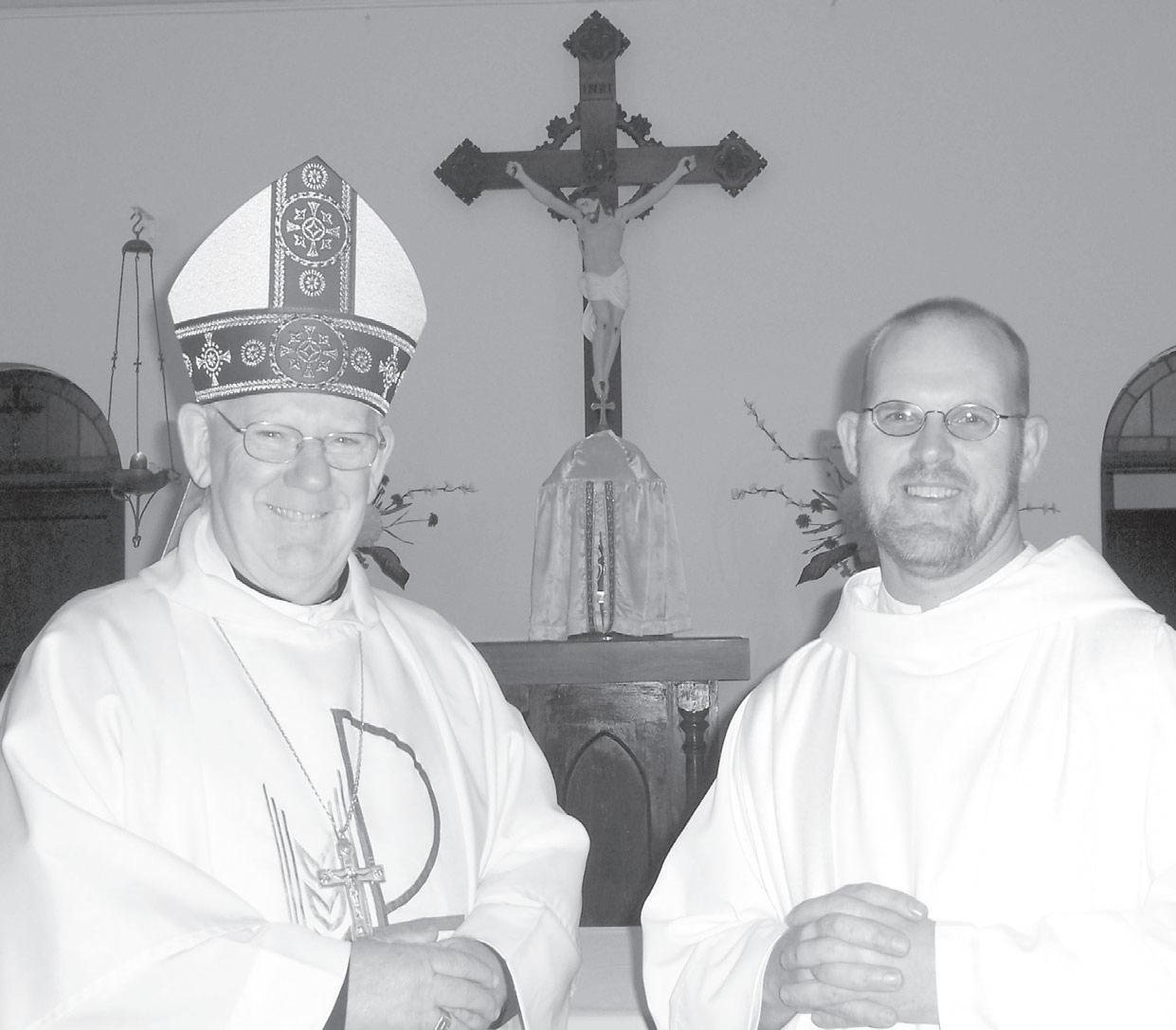
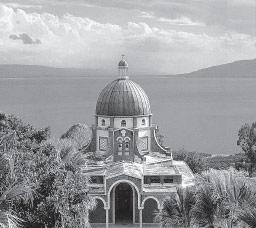
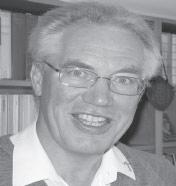
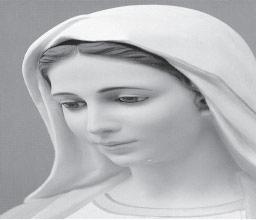
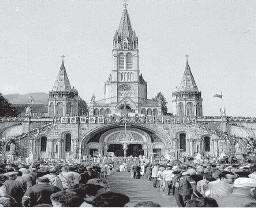
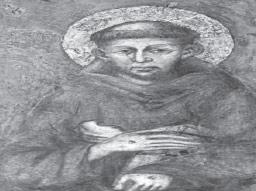
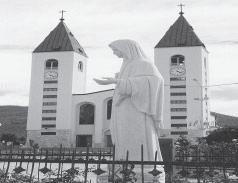
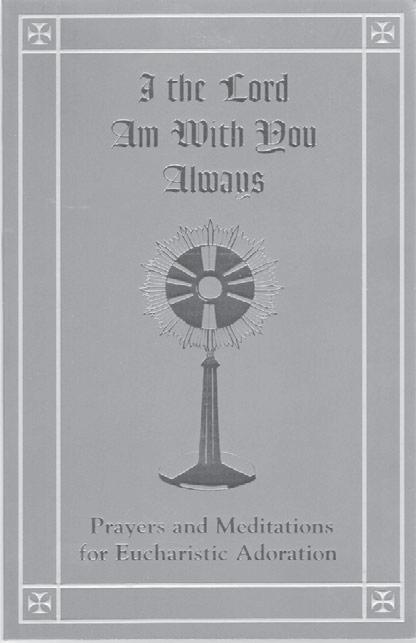

(10th October 04 - 29th October 05)
“The Church and the world have great need of Eucharistic Worship. Jesus waits for us in the sacrament of love. Let us be generous with him in going to meet him in adoration and in contemplation that is full of faith and ready to make reparation for the great faults and crimes of the world.”
(John Paul II: Dominicae Cenae 3)
“This book ... contains a wealth of prayers, thoughts and meditations, all centred around the Real Presence of Jesus in the Blessed Sacrament ....It is a privilege for us to be able to spend time before Jesus in the Blessed Sacrament. During those precious moments we sense Jesus' tremendous love for us. We bring to Him our joys and our sorrows, we talk to Him about the needs of those around us, and we ask for that deep conversion of the heart and mind that will make us one with Him ... I commend this book to all, especially to those who have rediscovered the beauty and joy of Eucharistic adoration..."
Most Rev. B. J. Hickey - Archbishop of Perth
A beautiful set of Vatican Rosary beads will be sent to all those who give an additional charity donation of $10.00 or more to help the projects of Aid to the Church in Need for the persecuted Church in Sudan*. Please tick the box below if you would like to receive the Papal Rosary beads.

April 28 2005, The Record Page 5 Flightworld Travel Perth (08) 9322 2914 Travelscene Lords (08) 9443 6266 FREE CALL 1800 819 156 Lic. 2TA 003632 HARVEST PILGRIMAGE S Rome (3 nights) Medjugorje (7 nights) Visit this village of grace and peace where it’s reported Our Lady still appears daily. MEDJUGORJE Departs 18 June, 27 July, 8 September, 8 October and 30 October 2005. Medjugorje only option also available from $2895 $3490 from VISITATIONS OF MARY Lisbon • Fatima Anniversary • Avila Burgos • Garabandal • Loyola Lourdes • Optional Medjugorje Extension Departs 10 June with Fr John O’Connor, 10 Sept & 10 Oct 2005. $4495 from GRACES OF ITALY Departs 28 Jun, 30 Aug & 29 Sept 2005 $4795 Padua • Venice • Ravenna • Florence Siena • Assisi • Loreto • Lanciano San Giovanni Rotondo • Monte Sant Angelo • Pietrelcina • 13 days Optional Rome extension • Medjugorje link from $3995 Also departs 15 Sept (with Bishop John Gerry) & 17 Oct 2005 from $3795 from RETURN TO THE HOLY LAND (price ex-Sydney) Pope John Paul II has encouraged “pilgrimages of peace to the Holy Land...I encourage it with all my heart”. Cairo • Mount Sinai • Petra Amman • Sea of Galilee • 13 days Optional Jerusalem extension (4) Departing 14 June with Fr Damian Wynn-Williams GRACES OF FRANCE All prices listed do not include taxes Lourdes • Avignon • La Salette Taize • Ars • Paray le Monial • Nevers Chartres • Lisieux • Optional Paris Departs 18 June and 18 September 2005 $4695 from OrderForm: “I the Lord Am With You Always” Send to: Aid to the Church in Need, PO Box 6245 Blacktown DC NSW2148 Phone/Fax No: (02) 9679-1929 E-mail: info@aidtochurch.org Web: www.aidtochurch.org Please send me: Number Amount . . . . . I the Lord Am With You Always ($12) . . . . . . . Plus $2 per item for postage & handling . . . . . . . Charity donation for Sudan * Total enclosed Please send me the Vatican Rosary beads * Signature . . . . . . . . . . . . . . . . . . . . . . . . .Exp Date . . ./ . . . BLOCK LETTERS PLEASE Mr/Mrs/Miss/Ms/Rev . . . . . . . . . . . . . . . . . . . . . . . . . . . . . . . . . Address . . . . . . . . . . . . . . . . . . . . . . . . . . . . . . . . . . . . . . . . . . . . . . . . . . . . . . . . . . . . . . . . . . . . . . . . . . . . .Postcode . . . . . . . BankcardVisaMastercard PG:517 Payment method:Cheque/money order enclosed OR Please debit my credit card ACN is an international Catholic charity dependent on the Holy See, supporting the faithful in countries where the Church is poor or persecuted. I the Lord Am With You Always Prayers and Meditations for Eucharistic Adoration
published in 1999, this second edition contains new material and a chapter for children of First Communion and Confirmation age.
First
The Year of the Eucharist
Just $12 a copy Read it in The Record
Holohan with Benedictine monk Fr John Herbert at his introduction as Parish Priest of Dardanup.
Collie hits high note
Members of one of the world’s leading philharmonic orchestras performed a sacred and classical music concert in St Brigid’s Catholic Church in Collie on Sunday, April 17.
It was the Cologne New Philharmonic Chamber Orchestra’s third visit to the town after previous concerts in 2001 and 2003.
The eight musicians delighted the audience with a varied program from Vivaldi, Marcello, Mozart, J.S Bach, Tchaikovski, Albinoni, and Pachelbel.
Apart from necessary lighting for the orchestra, the church was in darkness, with spotlights outside lighting up the church’s beautiful stained glass windows.
Parish Priest Fr Leo Curran ofm said it was not really clear why the Orchestra had first approached the parish for permission to play in the Church in 2001.
“They said they preferred to play in a sacred place and a place of beauty, and both the town and the church met their standards, but I don’t know how they discovered Collie or what led them to choose
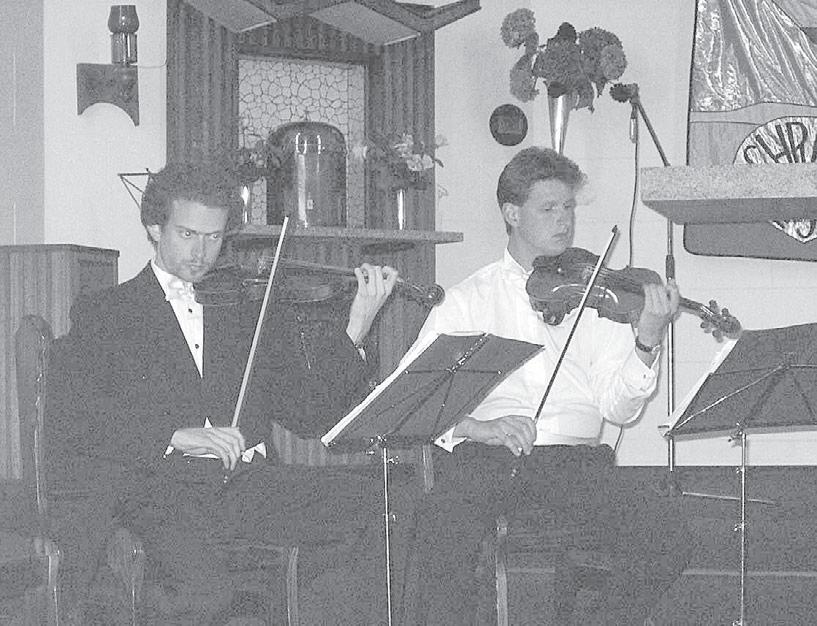
it,” he said. “They were obviously happy because they returned in 2003 and again this year.”
The concerts were staged as a cultural event for the community, not as a fund-raiser for the parish.
The Cologne New Philharmonic
Orchestra has a program of sending chamber orchestras to various parts of the world to give young musicians developmental experience in travelling, organising, and playing before audiences in a variety of settings.
Mission gives back for poor
■ By Jamie O’Brien
Chris Webb has found a special mission in the archdiocese of Perth.
The Maylands man goes daily to a number of food outlets and distributes the food they donate in Forrest Place to anyone who is in need.
Since February last year, at close of business around 5pm every day Mr Webb drops off the containers to the food outlets - some whose owners are Catholic – and then waits for owners to bring the containers to Forrest Place where he can be found talking to the homeless and young people.
One of the business owners who supplies food to Mr Webb, who preferred not to be named, said he mainly supplies sandwiches, muffins, sweets and pastries, because at the end of the day there is enough food left over for approximately 30 to 50 people.
“I met Chris a year ago and he came up with the idea and could channel it to the right people and in doing so is spreading the word of God,” he said.
“I really appreciate the work that he is doing.”
He said he would continue providing food as long as Mr Webb is willing and he has the business.
Unfortunately, Mr Webb has already encountered some opposition from local Police, businesses and the local council who appear to be uncomfortable with what he is doing.
Mr Webb says he feels his mission developed out of a number of different experiences.
After spending time as a student in St Charles’ Seminary and deciding it was not what God wanted from him, Chris decided to dedicate his life to the poor.
Prior to this he spent four years in Italy in an order called the Family of Mary Coredemptrix, a lay community that live as religious and strive for holiness.
Mr Webb says this experience has helped him to maintain a
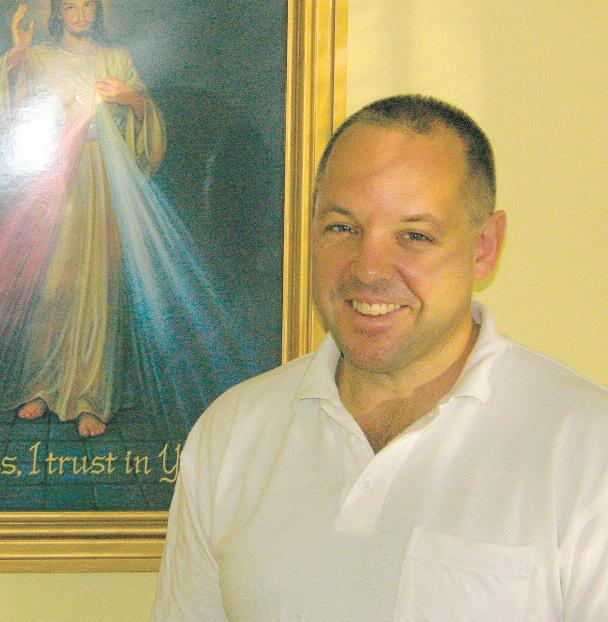
devotion to the Virgin Mary.
“These are kids from ‘good’ families who because of drug use, sexual orientation problems and lack of education feel they have almost been betrayed by society.”
“For many of them it is a poverty of love,” he said.
“Often, the fabric of their family has fallen apart and they’ve never been given the love and nurturing of a family.”
Mr Webb has also recently re-commenced a Bachelor of Theology degree at Notre Dame University.
Through these events Mr Webb has now formed an association called Children of the Cross.
The work he is doing is fulfilling the objectives of the association, which is to serve the poor and rejected, “especially by being with them and sharing their life experience,” says Mr Webb.
At present, he is looking for volunteers to help him who are able to offer accommodation for some of the homeless youth at a
Deacons come to lunch
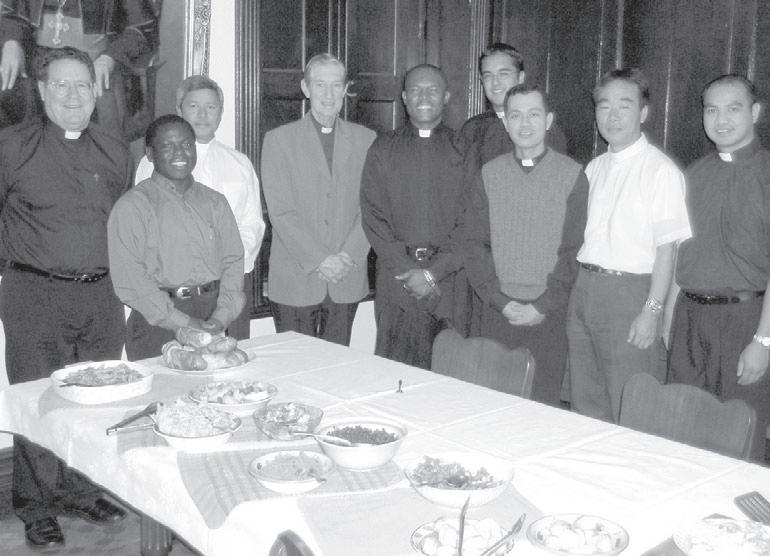
Archbishop Barry Hickey invited the eight deacons working in Perth parishes to lunch at the Cathedral presbytery last Thursday, along with the Dean and other priests of the Cathedral Parish.
The Archbishop described the lunch as an opportunity to maintain contact with the deacons and to give them the chance to build a sense of community with other priests.
The deacons and their parishes are Andrew Albis (Lesmurdie), Kenneth Asaba (Highgate), Andrew Bowron (Willeton), Gavin Gomez (Whitford), Joseph Lee (Cathedral) Clayton Mitchell (Ballajura), Nicholas Nweke (Lockridge) and Nelson Po (Bateman).
The deacons are gaining pastoral experience and completing their studies prior to ordination to the priesthood.
Mercy College draws crowds
More than 3000 people attended the annual Mercy College Community Fun Day in Koondoola recently. Show bags, rides, displays from the Western Australian Police and the Fire Brigade, music from the College Choir, Jazz Band and Performing arts students provided entertainment for the large crowd, while a sausage sizzle and food stalls satisfied their appetites.
Mercy College Community relations officer Chas Bursey said the day had been a great success.
“The weather was perfect and we wanted to celebrate our Fun Day with the whole community and give people some free entertainment.”
The continued success has given the College momentum to further promote its role in the local community.
Muslims attend papal audience
VATICAN CITY, APRIL 26, 2005 (Zenit.org).- At his first general audience on Wednesday, Benedict XVI greeted Muslims who were participating in a symposium of Islamic-Christian dialogue organised by the Focolare Movement.
Sources in the movement confirmed the attendance to Zenit. The Focolare Movement organised the symposium entitled “Who is God
for Us?” at Castel Gandolfo, south of Rome. It opened last Sunday.
About 100 Muslims from 33 countries, including the United States, Canada, Libya and Indonesia, participated in the papal audience.
Speakers at the Focolare symposium have included Archbishop Michael Fitzgerald, president of the Pontifical Council for Interreligious Dialogue.
College marks patron
Maylands residence provided by the Archdiocese.
He says this will increase the chances of many of the youth changing their lifestyle, as sometimes what is needed is simply a change of environment.
“It will draw them towards a better life.”
Mr Webb says a number of the people that come regularly to collect food, particularly the youth, go from squats or various accommodations three or fours times a week.
“Many of them also don’t know any better,” he said. “And no one has the desire to do anything about it.”
For Mr Webb, the mission is also about giving something back to the Church and to society.
“I feel an openness to be with people in the midst of their crises,” he says.
Interested persons can contact him via The Record on (08) 9227 7080.
Subiaco’s Calcutta mission effort - Vista 4
La Salle College in Midland celebrated the feast day of St John Baptist De La Salle, Patron Saint of Teachers, on Thursday April 7.
The students witnessed a dramatic presentation of the early years of the new Christian schools.
They learned how a rich man could be prepared to give up everything he owned and rely on the charity of others to educate the poor.
St John gave to his new schools many of the ideas with which we are familiar today, especially the way in which our classes operate.
Students dressed as the Brothers of the Christian schools, recreated the Heroic Vow of those first brothers who swore to carry on even if they had to live on bread and water.
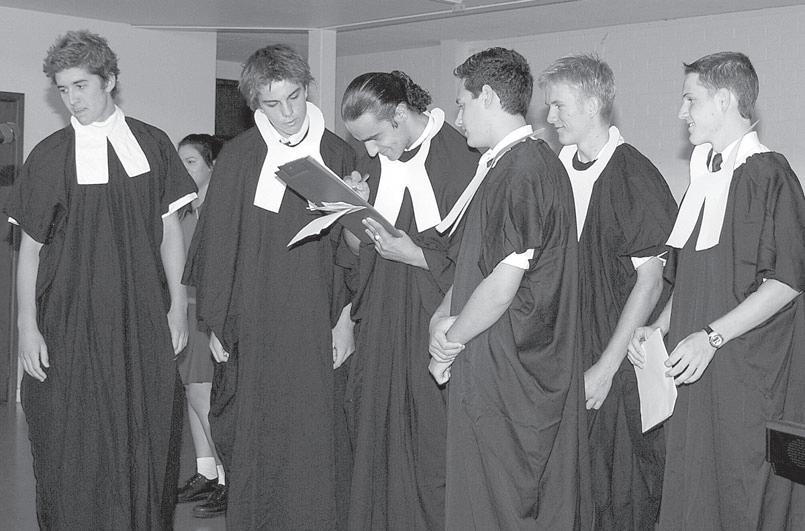
Page 6 April 28 2005, The Record
Photo: Derek Boylen
Members of the Cologne New Philharmonic Chamber Orchestra perform in Collie’s St Brigid’s Church on April 17.
Chris Webb: his mission is to be with the poor and homeless of Perth’s streets.
Teams invite lapsed to rediscover Church
■ By Jamie O’Brien
Perth’s Catholic Youth Ministry has launched a mission through dedicated groups of young people called Truth About God evangelisation team.
The TAG team has recently begun doorknocking through the streets of Our Lady’s Assumption Parish of Dianella, where CYM Director Fr Don Kettle is Priest-in-charge.
CYM is the official agency promoting and supporting youth ministry in the Archdiocese of Perth.
“Our aim is to assist young adults to build a deep and lasting relationship with Jesus and to help them find their place in the Church and world,” Fr Kettle said.
“We strive to evangelise, educate, inspire, encourage and support young people as well as initiate activities for them in the Archdiocese.”
Fr Kettle went on to say how the CYM team uses a holistic approach to the youth apostolate, ministering to the emotional, spiritual, and social needs of young people.
Youth Minister Lucas Hurley said the name for the team, Truth about God, is the English translation of the Latin phrase, Veritas Dei.
Through doorknocking, Lucas Hurley, Caroline Watson, Carmel Winton, Paul Bui, John Rullo, Olivia Lavis, Cheryl Lyra, Matthew Charlton and Kim Farihna as well as Fr Kettle, are encouraging lapsed Catholics to come back to the Church.
“This is the definition of evangelisation,” Mr Hurley said.
“The apostles experienced great joy in their hearts upon the resurrection of Christ and felt the need to evangelise, so we are going to do the same.”
The invitation that is extended
through their work, said Mr Hurley, is very personal.
“It is going to a person’s home and knocking on their front door faced with the possibility of rejection.”
If rejected, a team, usually made up of both students and young professionals, walk away.
Discussing why the TAG team felt there was a need for the mission, Mr Hurley spoke about the declining number of young married and single people attending Mass and the sacraments, and said that it is possible for them to return to the Church.
“It is possible no matter what their situation,” he said.
“Christ has had his hands and feet nailed to the cross and we should all remember that it is for this reason we do not need to be afraid.”
Other initiatives TAG teams coordinate as part of their evangelisation mission are Youth revivals, which involve twilight retreats and mission sessions, in which they hand out pamphlets in the Hay and Murray Street malls of Perth inviting lapsed Catholics to return to the sacraments.
For the past month, the team has been through a period of formation, where they prepared for their upcoming tasks.
This has continued on a weekly basis.
The team was recently given the opportunity to listen to Fr Gino Henriques, Director of Evangelisation for Asia Pacific and Oceania in which they learnt about four stages of the development of youth ministry.
‘Contact,’ the initial step of reaching out, is followed by ‘Content,’ the announcement of the good news of Jesus to the people and the experience of formation for the mission.
This leads on to ‘Commitment,’
When Rome ran...
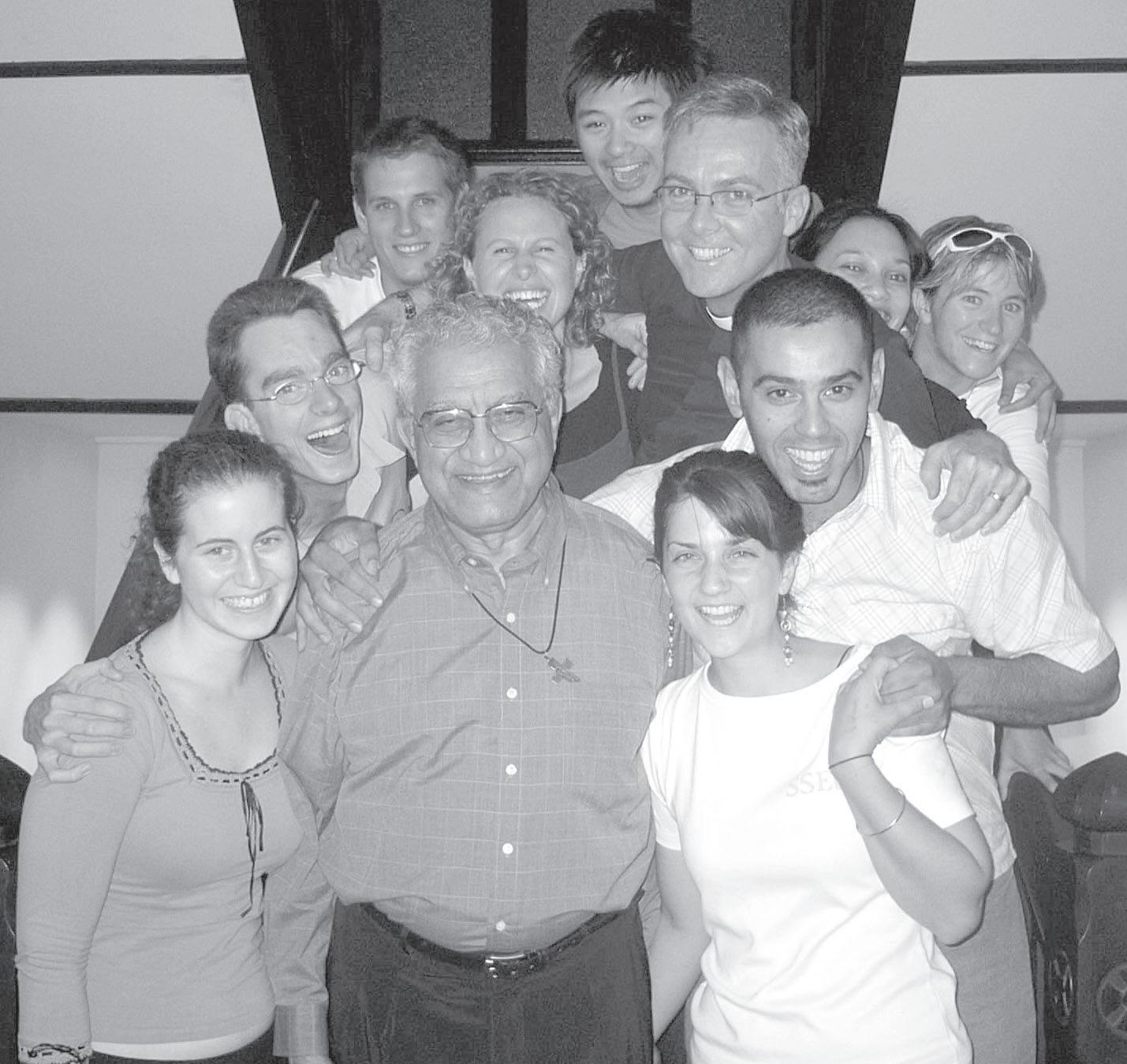
which involves an experience with Christ and the knowledge of who they are committing themselves to, as well as the evangelisation of themselves by the Holy Spirit.
The final step is ‘Commission,’ where the mission of evangelisation is fulfilled. Fr Henriques said the
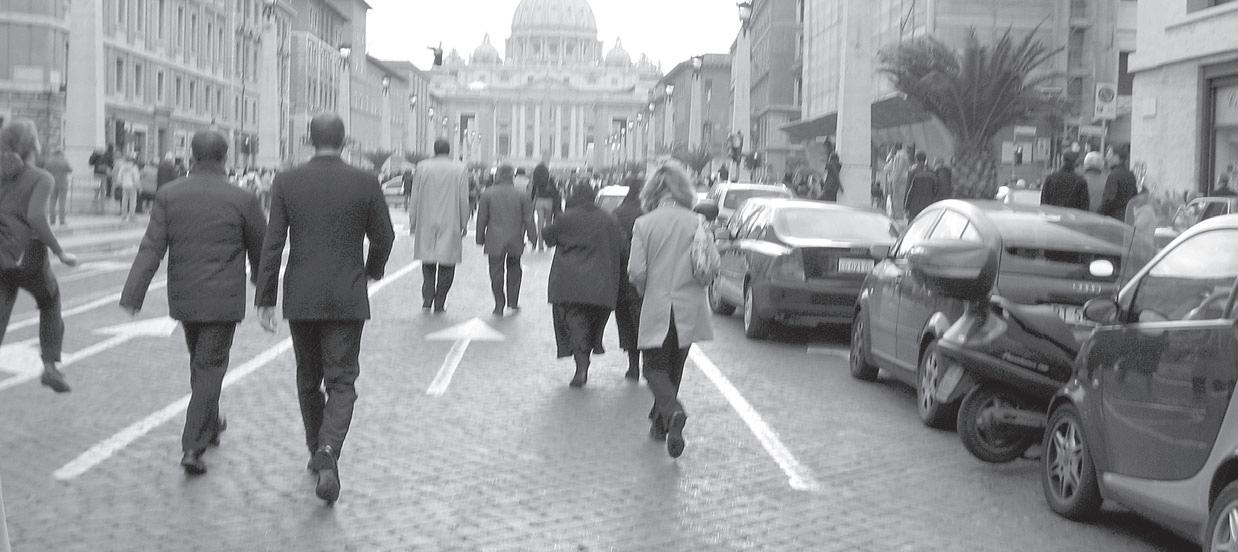 ■ By Michelle Jones, in Rome
■ By Michelle Jones, in Rome
The recent election of Benedict XVI has been analysed and discussed from many angles: pre-conclave politics; the significance of ‘Benedict’; the shape of Christian unity in a Benedict XVI papacy; the transformation of the ‘Rottweiler’ of the Congregation for the Doctrine of the Faith into the ‘German Shepherd’ of the universal Church. Thank goodness no-one has spoken of the emergence of the gentler, sweeter Joseph Ratzinger as the advent of the ‘chocolate Bavarian.’ For me, the dramatic joy precipitated by the appearance of the white smoke from the Sistine Chapel is my entrée into reflecting on the papal election. I was at university when the unprecedented shrill of an electronic buzzer proclaimed that white smoke had been spotted. Abandoning my regular Tuesday schedule, I joined the scurry to St Peter’s. Urged on by the manifold pealing of bells, locals, priests, students, pilgrims, religious and
the simply curious united in flocking into the Vatican for the pronouncement of the new shepherd.
The intensity of dramatic joy was unique: the journeying towards the unknown, the anticipation, the sense of unity, the excitement and, penetrating it all, the tremendous awareness that in the midst of human fragility the Divine was at work.
In these days since the announcement of Benedict XVI - when we are starting to feel a little ‘Petered out’ - that concentrated experience of dramatic joy resounds within me.
I realise that the experience of that Tuesday evening was a glimpse into the dramatic, joyful journey into Mystery on which the Holy Spirit is continually guiding the Church; a glimpse into the joyful drama of the Spirit’s work in each of our own personal lives. How Benedict XVI’s papacy will unfold remains to be seen, but we can be assured that we will not be bereft of adventure.
stages however, are just beginnings. “With each experience the next becomes greater and our growth as Christians is ongoing,” he said.
Fr Kettle said it is important that each member of the team feels called to carry out the mission.
One of the most important les-
sons, said Mr Hurley, has been humility.
“This is at the front of our missionary zeal,” he said. Mr Hurley went on to say he hopes the TAG team can fulfil their next mission in the parish of Carlisle.
Abortion taskforce surveys resources
The Australian Bishops’ Taskforce on Pastoral Responses to Abortion says its survey of Church sponsored or affiliated services for women, their partners and families is already well under way.
The taskforce met recently in Sydney.
Announced after the Australian Catholic Bishops Conference Plenary in November 2004, the taskforce is investigating ways in which the Church can improve its support for women, their partners and families so as to enable and encourage them to continue with an unexpected or difficult pregnancy.
“There are already many signs of hope and expressions of love and practical concern for pregnant women within the Catholic community.”
Following the recent meeting, the Chairman of the taskforce, Bishop Eugene Hurley, said that while abortion had faded from the media spotlight in recent
months, the taskforce remained committed to promoting realistic alternatives to abortion. Bishop Hurley said a comprehensive survey of Church sponsored or affiliated services for women, their partners and families was already well under way.
“There are already many signs of hope and expressions of love and practical concern for pregnant women within the Catholic community,” he said.
In future months the taskforce will listen closely to women in order to better understand the circumstances leading to unwanted pregnancies and the pressures placed upon women to abort.
“We want to listen and learn from the lived experiences of women, their partners and families, who are considering or have been involved in abortion,” Bishop Hurley said.
“The Church is already doing a lot to help, but we hope to do more.”
The taskforce will identify and recommend ways of responding to gaps in current services for pregnant women, and identify practices which could be made more welcoming. The taskforce will report to the Bishops in May.
Catholic Youth Ministry’s TAG team members with Fr Gino Henriquez, at front, and Fr Don Kettle towards the rear. The teams engage in an effort to reach out to lapsed Catholics through doorknocking suburban homes and inviting people to return to the Church. Photo Courtesy Catholic Youth Ministry
The Scurry: On the tide of dramatic joy, pilgrims (including one woman mid-air, at left), Romans, religious, and clergy flood into St Peter’s for the announcement of the new Pope.
Photo: Michelle Jones
April 28 2005, The Record l Page 1 Vista


Scalabrini: Citizen of the World

A triduum will be held at St Brigid’s Parish Northbridge next month marking the 100th anniversary of the death of Giovanni Battista
Scalabrini who died in Piacenza, near Milan in Northern Italy on June 1, 1905. At the time of his death he was mourned by Pope Pius X, Bishops, priests and laity from around the world. His passing was felt most - by the people in his diocese and the members of the two religious congregations he had founded for the care of migrants. What made him so special?
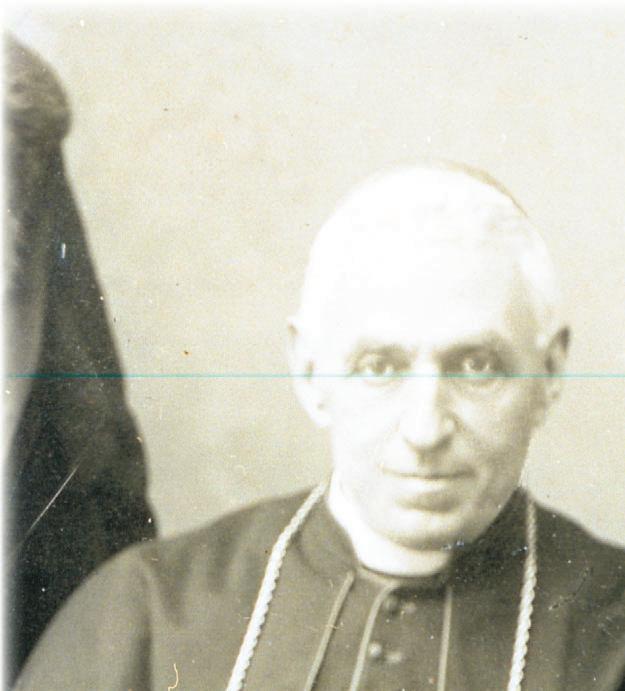
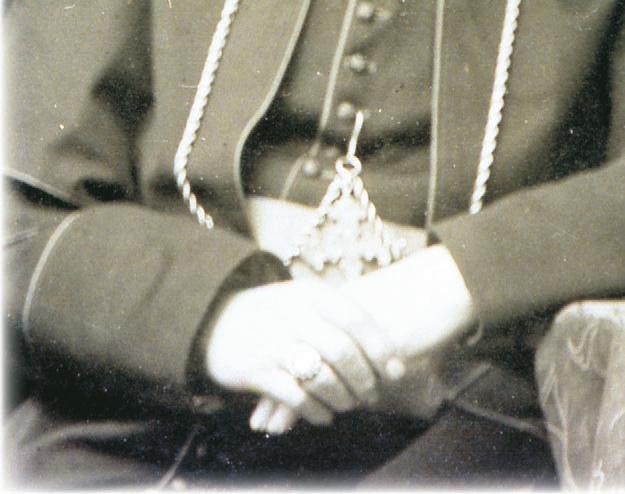

Innovator helped migrants retain their faith
■ By Fr Tony Paganoni
Bishop Scalabrini was well aware that becoming a world citizen meant more than simply being a tourist, it meant being involved personally. His note written to Pope Pius X a few days before his death says:
What I saw in my travels through the United States and Brazil remains as fresh in my mind as if I were there now, and the emotions I experienced there will never leave me.
He shared the migration adventure, and, like those who crossed the oceans as emigrants, he saw many new lands. On board ship, he was at the disposal of his countrymen on their way towards their “promised land”, being to them not only priest and adviser but consoler.
Emigrants enter a world that is faceless,
without friends or language; they have no knowledge of the new locality and have little to say for themselves beyond their name and state of health. There is a challenge for the Church not to let any part of this extraordinary adventure of emigration be lost. The inheritance that Scalabrini has bequeathed to us - this priest-bishop-missionary-chronicler, historian also, and sociologist of emigration, but most of all man of God attentive to the migrants’ stories - is an example of supreme dedication to this cause.
During his time in Brazil and Argentina, he used whatever form of transport was available in order to reach the emigrants engaged in the difficult process of re-settlement. Reflecting later on this experience, he wrote: the Catholic Church is called by its divine apostolate and by its centuries-old tradition of caring for the poor to put its stamp on this great social movement of emigration which seeks economic renewal and the union of peoples.
The many places he visited in the United States included Washington where in November 1901 he met President Roosevelt.
Interviewed in December 1901 for L’Italia
Coloniale, he commented: In four and a half months I covered 9,000-10,000 miles, visited more than 50 cities and gave over 350 discourses... I am more than ever convinced that it is necessary for our emigrants to keep their national culture in order to keep their Catholic religion, which otherwise would be lost. Religion and country are indivisible. His report to the Pope on 26 November1901, stated:
The meeting was useful not because the Americans understood me, but because I understood them. No one is aware that immigration is an extraordinary resource, a huge gift for a country that is in the course of construction. This perception has to be changed so that immigration comes to be seen as advantageous, so as then to lead to advantageous conditions, that is, humane conditions.
Giovanni Battista was born the third of eight children to Luigi Scalabrini and Colomba Trombetta, in the village of Fino Mornasco in the Province of Como, where his family, originally from the Grison in Switzerland, had settled in 1700. After High School, he entered the Seminary,
but not with the idea of isolating himself from the world. In his early priesthood he noted with concern the exodus of many from his region who crossed into Switzerland in search of a better future.
Some years later, as Bishop of Piacenza, he had priests keep a record of the numbers of parishioners who emigrated. When he was parish priest of St Bartholomew’s in Como, no emigrant had left his parish without a letter of presentation to the priest where he would find work.
The year 1870 saw the beginning of mass emigration from Italy: more than fifteen million left between 1876 and 1915, a third of the population. The Government seemed unable to find solutions to the country’s problems, and people left rather than starve on low wages.
Scalabrini closely associated himself with the migrants and their needs, showing an extraordinary capacity for relating to their experience and crystallising its essence from so many stories of pain, helping us to understand and share the sense of what is happening today, wherever it may be.
The Programme
Triduum at St Brigid’s Church, Northbridge
Wednesday 11 May, 7.30pm (in English)
Indonesian, Chinese, Vietnamese communities
Thursday 12 May, 7.30pm (Italian)
Friday 13 May, 7.30pm (English)
Solemn High Mass
Sunday 15 May, 4pm
Celebrated by Archbishop Barry Hickey and clergy. Light refreshments plus Corica pastries will be served in the Hall every evening
ALL WELCOME
Giovanni Scalabrini with a group of Italian clergymen on their way to New York.
Giovanni Scalabrini gives a blessing before crossing a large river.
Page 2 l April 28 2005, The Record April 28 2005, The Record l Page 3 Vista Vista
Bishop Giovanni Battista Scalabrini
Subiaco parish backs Calcutta mission
■ By Jamie O’Brien
Australian of the Year and Perth burns specialist Fiona Wood recently helped to launch a mission in aid of the poor and destitute of Calcutta, initiated by St Joseph’s Subiaco parishioner Rod Pereira.
Mrs Wood was happy to help because she had once worked in Bombay as medical student.
The driving force behind the Calcutta Station Mission is Rod Pereira from St Joseph’s Parish in Subiaco, who has established the non-profit organisation to help the dying and destitute in the slums of Calcutta (now known as Kolkata).
Mr Pereira, who also works as a nurse with the Australian Red Cross Blood Service, first visited Calcutta in 2001, during which he says he had a life-changing experience.
For six months he worked as a volunteer with Mother Teresa’s Missionaries of Charity homes for
the dying and destitute in Prem Dan and Kaligat.
He worked together with a handful of volunteers under the guidance of a man named Jim Maginnis, in what is termed Station Work.
It was at the two train stations of Calcutta, Howrah and Sealdah, not part of the MC mission, that he found himself administering first aid, feeding the starving, clothing the naked and arranging transport to Prem Dan and Kaligat.
On his return to Perth, Mr Pereira told his stories to families and friends.
Last year he returned to Calcutta for two months to continue working with the poor.
It was after this second trip that Mr Pereira says he realised more needed to be done to continue this work, as funds were limited and resources exhausted.
It was from these events that the Calcutta Stations Mission was born in November 2004.
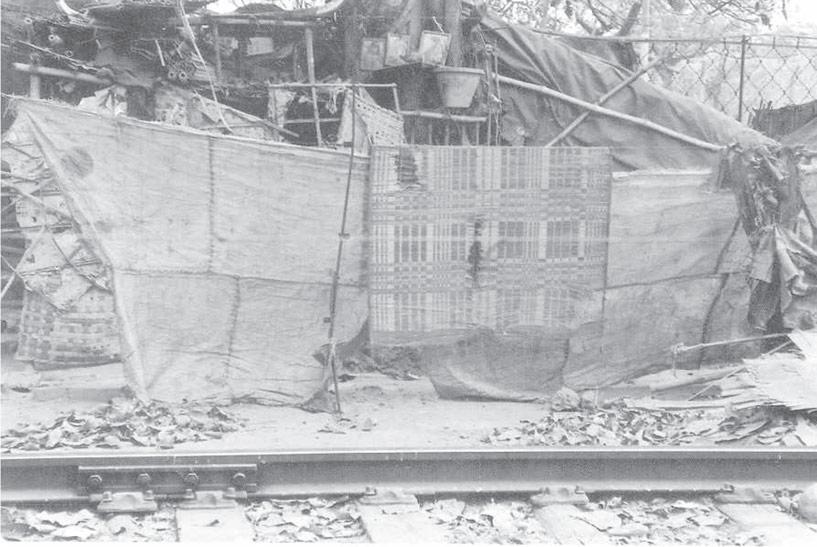
Mr Pereira says Calcutta appealed to him for a number of reasons.
Over half the 14 million people live below the poverty line in officially recognised Bustis – meaning settlement.
“These people could be considered the privileged of the poorest with the bare minimum of sanitation.”
“Less fortunate are the squatters, making up an estimated 10% of the population (equivalent to the population of Perth), who live on the streets and railways stations.”
“Worse still are the homeless, the poorest of the poor, who, if lucky, may possess a filthy mat and a tin bowl.”
‘Houses’ made of cloth and plastic are pitched wherever possible and represent some of the most degraded living conditions imaginable.
In the first six months he was there during 2001, Mr Pereira says he and other volunteers saved more than 40 lives.
During his visit for two months last year, that number increased by 20.
“It all depends on the climate and season and what diseases are being spread at the time,” he said.
Mr Pereira said the reason so many homeless people congregate at the train stations is because of the large number of people passing through and access to sanitation.
Mr Pereira’s parish of St Joseph’s in Subiaco is now working to make his work in India part of the parish evangelisation plan.
CSM chairman Rick Ferdinands has been working with Mr Pereira to put together a business plan so that the initiative can be recognised as a charitable organisation.
Mr Pereira says he hopes CSM

will be able to expand to become a relief and development organisation.
Also of great assistance to the organisation were Dean Scarparolo, who researched tax laws and what it takes to set up a charity, and his wife Michelle, who was responsible for organising the launch.
Mr Scarpolo said it was the help of Fr Joe Walsh and a number of
other volunteers, who showed him what a community in action can achieve.
“We plan to involve the Indian community and through sponsorship provide rehabilitation, education and employment.” Mr Pereira is returning to India in June.
For more information go to www.calcuttastationsmission.com
Mother Teresa star of movie Christian lobby flourishes
■ By Jamie O’Brien
A new movie about Mother Teresa will open in Perth in June, while funds raised by it will go to Catholic Mission.
The world’s most famous missionary has been portrayed as the Angel of Calcutta, who lived among the poorest of the poor in Kolkata, (formerly Calcutta) feeding and housing abandoned children, lepers and the dying.
Funds raised from the $20 million dollar movie about Mother Teresa will be going to Catholic Mission.
Catholic Mission – known internationally as the Pontifical Mission Societies – is the Pope’s main missionary instrument across the globe.
Catholic Mission Funding is used to help these same people today – in 2004 more than $385,000 was sent directly from Australia to help children in India with basic necessities such as shelter, medicines, healthcare and education.
That was part of a total $8.1 million raised across Australia for developing countries.
The movie was filmed in Sri Lanka and Italy and focuses on the life of the simple nun, who, although small in stature, showed the world that unconditional faith and strength of spirit are much
more formidable forces than size or power.
Mother Teresa never owned more than a blue and white sari, yet she influenced the decisions of some of the world’s most powerful people.
In 1950, she established her own religious order called the Missionaries of Charity that continues her work throughout the world today.
In 1979, Mother Teresa won the Nobel Peace Prize.
The movie focuses on the life of the simple nun, who although small in stature, showed the world that unconditional faith and strength of spirit are much more formidable forces than size or power.
In what is said to be a film reminiscent of the 1982 film Ghandi, Golden Globe award-winning actor Olivia Hussey authentically portrays the character of Mother Teresa.
In the film, the energetic leader considers herself as but ‘a pencil of the Lord’ and provides a clear insight into what she would have experienced in the slums of India.
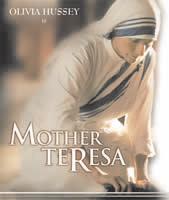
Viewers see her caring for abandoned children, mentally ill and handicapped individuals, lepers, the indigent, the aged, and the dying.
The film’s simple approach – demonstrating Mother Teresa’s desire to build the City of Peace, an area with schools, accommodation and housing for the poor - shows that with much determination and prayer, the spirit of Christ can burn brightly against the staggering dimensions of pain, poverty, and human misery in the world.
Olivia Hussey wrote to Pope John Paul II last year regarding the movie and her role and received a letter back offering the Pope’s apostolic blessing.
The film opens in Perth on July 20.
Pre-bookings are advised by calling 1300 725 728 to avoid disappointment.
Archbishop Barry Hickey was among more than 200 people who attended a breakfast function organised by the Australian Christian Lobby last Saturday to hear a report from national Executive Chairman Jim Wallace.
The ACL is an apolitical, nondenominational lobby group whose vision is “to see the Christian vote and opinion count in the way we are governed, do business and conduct ourselves as a community”.
Jim Wallace spent 32 years as a career soldier and commanded the SAS Regiment, the Special Forces Group, and the Army’s 1st Brigade.
He said there had been a dramatic change in awareness among Federal politicians about the importance of the values vote.
The Marriage Act Amendment to define marriage as being a union between a man and a woman, proposed by the Australian Family Association, and the associated Marriage Forum in Canberra sponsored by the AFA and the Fatherhood Foundation, with support from the ACL, had put values high on the political agenda before the last election.
There had been a record number of submissions to the Senate inquiry into the Marriage Act Amendment and this, combined with the big crowds at the Marriage Forum, had affected the whole of Federal parliament. It came alive with the realisation that Christians were standing up for their values.
Mr Wallace said that lobbying was not the main business of the Church, but there was a legitimate place for Christians to influence politics to ensure that the community was governed by decent values, not by the false values promoted by other lobby groups.
He said the Catholic Church had held the line virtually alone for many years and it was now time for Protestants to take some responsibility.
The ACL believed that Christian lobbying had to be smart lobbying, based on building relationships, taking on strategic issues rather than all issues, and creating a presence in the early stages of debate rather than waiting until things reached the floor of Parliament.
The ACL was apolitical and worked with Christian MPs in all parties to try to get Christian values adopted across the board.
The ALP was facing a crucial moment in its history when it would either move towards values or towards the dark side.
There was a committee of MPs reporting to Caucus on these issues and the ACL would do what it could to ensure that the meaning of values in legislation was properly understood.
There was already too much legislation in Australia tying people and parliaments in knots and preventing the implementation of values in the community.
A typical scene from the streets of Calcutta. Millions of people spend their whole lives living in accomodation such as this.
Subiaco parish is working towards making the Calcutta Stations Mission part of its own parish evangelisation plan.
Page 4 l April 28 2005, The Record Vista
the family is the future
i say, i say
Careful! You’re the model Only Rome could pull it off like this
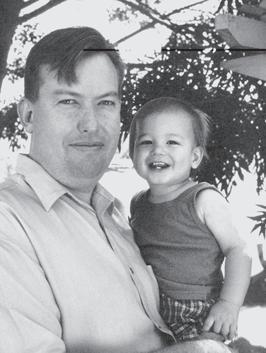 ■ With Derek Boylen
■ With Derek Boylen
The world needs more ethical leaders. We need leaders who are guided by ethical and spiritual values. The first example of leadership that most people experience is their parents. Who first taught us the skills that are needed to resolve conflict, listen, negotiate, be assertive and so forth? It was our parents.
The challenge is for us, as parents, to be an example of leadership guided by our faith and values. Our decisions need to be seen to be guided by qualities such as authenticity, generosity, justice and fairness; an example of the gospel lived in the world.
I recently interviewed a mother of seven wonderful men and women (Jo) and my own mum (Bev). I asked them about the qualities they felt were important, as their children where growing up. Mum said what she felt was important was a sense of family and unity, faith development and regard for the other (“caring, compassion and respect”). When asked to elaborate on what was meant by faith development she recalled that she had become Catholic shortly before getting married and saw Christian principles and values as extremely important. Mum said that for her having Christian values meant having “respect for other people, caring for other people, caring for the environment,” and the dignity of life.
When I asked Jo what the guiding values for her were, she said,
M o re ethi cal lea d e sr een ded

“honesty is very important,” loving, accepting, tolerance, patience, compassion, caring, “definitely a sense of justice… with six boys justice issues had to be worked out pretty quickly.” In today’s world all these values are needed more than ever and it is through their parents that most children first learn them.
Jo and Bev also suggested a couple of strategies they felt had worked for them. In Jo’s home, as their family had grown up, there has always been a rule of “no one was allowed to hurt anybody.” It was a strict rule and it extended not just to family members but other people and animals, “cruelty was absolutely outlawed.” Empathy was very important too. Jo emphasised the need to avoid taking sides. When a conflict broke out she would try to help each child understand the perspective of the other. For Jo empathy was very important. What is it like to be in the other person’s shoes?
When talking to Mum she noted that in many homes you aren’t the only leader in the family.
Husband and wife are a leadership team and should be unified in their approach. Both Jo and Mum felt that most of the disagreements that often happen in marriage should not be conducted in front of the children. Mum highlighted the fact that both parents in a marriage come from different families with different approaches to dealing with conflict. It is important for parents to see this as a strength when resolving issues and not a problem.
“Being unified does not mean ganging up on the children though” Mum said, “I always felt that if Dad or I had told you off then that was enough. You didn’t need the other parent to come down on you like a ton of bricks too.”
Children learn by watching everything we do and we are their first role models. One day our children will be society’s new leaders. I think that’s pretty exciting! It makes me think hard about the kind of leaders I would like our three sons to be and how they will recognise that in the way that I love and care for them.
 ■ With Guy Crouchback
■ With Guy Crouchback
Italy is in my mind associated with a cheerful and rather enviable form of anarchy and public disorganisation. I admire the Italian disdain for government and bureaucracy.
I have, to my great regret, been no closer to Italy than a fortnight in Malta, but when I think of Rome I have among other things a vague image of chaotic traffic, largely motor-scooters, weaving in and out of road-lanes around the Forum with a blithe and typically Italian disregard for officious rules.
And yet, it seems, when it is necessary, and organisation is demanded, the Italian people have proved that they can rise to the occasion. As can those Vatican and Church authorities sometimes called unworldly.
When four million people crowded into Rome and Vatican City for the funeral of Pope John Paul II and the enthronement of Pope Benedict XVI, the Roman and Vatican authorities coped astonishingly smoothly at very limited notice.
The administrative task was mind-boggling, yet now that it has been done and the vast crowdsthe equivalent to one-fifth of the entire population of Australia - have departed again, there have been no reports of trouble.
I doubt the governments of many other great cities would have done half so well. Look at the years of preparation and billions of dollars
that it is claimed are necessary to host Olympic games. The more one thinks about it - providing shelter, food, water and sanitation, keeping the crowds moving and also the necessary daily life and services of the city moving - the more Herculean the task seems.
Of course, the spirit of the crowds in Rome and Vatican City probably made things easier - they had come in a spirit of reverence and homage, not to make trouble. Surely, too, the spirit of Pope John Paul II’s sheer nobility and goodness moved among them. He remains, as well as all else, one of those who are great and unforgettable exemplars to the world. But even so, it was a notable - might one even, and quite seriously, say a miraculous - feat on the part of those in Rome and the Vatican responsible. This good news went unreported in the media apart from a few exceptionally perceptive commentators.
One of these was News-Weekly’s Max Teichmann. In a recent column he told of the experience of friends from Poland arriving in Rome among the vast crowds. Upon leaving the train they were approached by a policeman and asked if they had accommodation. They said they did not, but had brought warm blankets, and if necessary could doss down in the street.
“Yes, of course you can, if you wish,” said the policeman. “But we have accommodation and tent-cities - and very warm - and I can give you tickets and a map to help you get there.” Following the enthusiastic commendation of his Polish friends, Professor Teichmann said he would telephone the local Italian radio station to congratulate Italy. He mentioned also that a PolishJewish friend, Krakow-born and a Latin speaker, had telephoned him from Poland to say how thrilled she had been by the ceremonies, and how impressive and beautiful Pope Benedict’s Latin was.
Take a bow, ABC, the award for bigotry goes to...
Most of the media coverage of Pope John Paul II’s last days, the period of mourning, the funeral and the preparations for the conclave has been good, in newspapers and television.
Catholics and the general population have been treated to coverage far more extensive than ever would have been expected at any time in the past.
There has been the endlessly banal insistence by journalists that they know what the Church should be about, which is their own onetrack mind about sex, but apart from that, coverage has been good.
There have been occasional real errors like Jane Hutcheon insisting on Lateline that the Church is opposed to stemcell research when every journalist receiving a pay cheque should know that the Church is opposed to embryonic stemcell research because it involves the destruction of living human embryos.
The Church is fully supportive
of adult stemcell research and of the establishment of cord blood banks to store the material from umbilical cords for future medical use. Archbishop Barry Hickey, for example, has repeatedly endorsed the Rotary-sponsored Red Cross Cord Blood Bank being established here.
There has been the endlessly banal insistence by journalists that they know what the Church should be about, which is their own one-track mind about sex, but apart from that, coverage has been good.
However, by far the worst example of prejudice bordering on bigotry came on Stephen Crittenden’s Religion Report on Radio National on April 6.
Crittenden, who is not known for his affection for the Church, interviewed William M Johnston who, he said, was Professor of History at the University of Massachusetts from 1965 to 1999 and now teaches at the Yarra Theological Union in Melbourne.
Johnston has written what Crittenden called “the definitive history of Hapsburg Austria”, ‘The Austrian Mind’. (All quotes from the ABC’s transcript.)
The transcript reveals Johnston and Crittenden eager to describe the Pope and his governing of the Church as akin to a Hapsburg Court and to the Communist regimes of Eastern Europe.
The quality of the scholarship behind these images and allegations about the Pope’s alleged ‘cruel and vindictive personnel policies and practices’ was revealed by Johnston when he said there are 4000 bishops (a very rough estimate) and 3000 were appointed by the late Pope “ … and many of those 3000 appointees
involved passing over highly able priests who in the normal run of things would have become bishop.
So I like to think that probably 2500 more than capable potential bishops did not get the nod.”
Crittenden: “In other words there’s been a kind of cruelty to talented people who’ve been passed over.”
Johnston: “Exactly. They’ve been excluded, they’re not acknowledged, WE DON’T KNOW WHO THEY ARE, WE CAN JUST IMAGINE THEY’RE THERE. (Our caps) Their careers have been blighted if you will, and I regard that as a mistreatment, as well as a dreadful personnel policy.”
(The only part of that exchange that is certainly true is that many capable priests don’t become bishops. There aren’t enough dioceses for them all.)
Worse was to come.
Continuing the Hapsburg Royal Court analogy, Crittenden wondered whether the alleged, but
not specified, stifling of people came from “a few sinister characters, from Latin America in particular, who’ve actually come more to the fore”.
Johnston: “I’m sure you’re right. It’s come from parties whom we will have difficulty identifying because they don’t tell us who’s in charge of what and who’s imposing what. Part of the technique is the secretiveness, which makes it hard for observers to pinpoint the source of policies or the source of punitive actions.”
There you have it from an historian dedicated to scrupulous research of facts: He doesn’t know whether anything’s going on, and if anything is going on he doesn’t know who’s doing it to whom, but he and Crittenden are certain they are “sinister characters” and what’s more they’re “from Latin America in particular”.
Take a bow ABC. The award for boofheaded bigotry goes to Stephen Crittenden’s Religion Report.
April 28 2005, The Record Page 7


The World
US priests told the future is positive
Priests urged to reject ‘defensive crouch’ despite sex abuse scandal
■ By Ed Langlois and Jon Reddy
Meeting in Portland in mid-April, an alliance of more than 200 US priests eyed the future in the wake of the clergy sex abuse scandal and the election of a new Pope.
One of the nation’s top religion journalists urged members of the National Federation of Priests’ Councils not to “retreat into a defensive crouch” as a result of controversy. If priests close down emotionally, many non-Catholics who still yearn for the faith may not be able to make contact with it, said David Gibson. “It is vital that you remain open and human and vulnerable, true Christs to us all.”
Gibson, whose new book is “The Coming Catholic Church: How the Faithful Are Shaping a New American Catholicism,” said that “the future of the Church is at the parish level.” But, he said, today’s culture embraces belief but not belonging, making it hard to get many Catholics into church.
The Church ought not kowtow to modern culture, he said. What may bring people into community, he said, is that Catholicism stands for something but avoids fundamentalism. People will sense truth when they see the Church on a trek to find and show the “bright shining nugget” of meaning in a messy world.
The clearest moment of meaning comes in the Eucharist, Gibson said, telling priests they are the “gateway” to Mass and so must be ever welcoming and open.
The federation gathers clergy leaders from dioceses across the nation, giving them a united voice and fostering continuing formation. It represents approximately 26,000 US parish priests who serve in 125
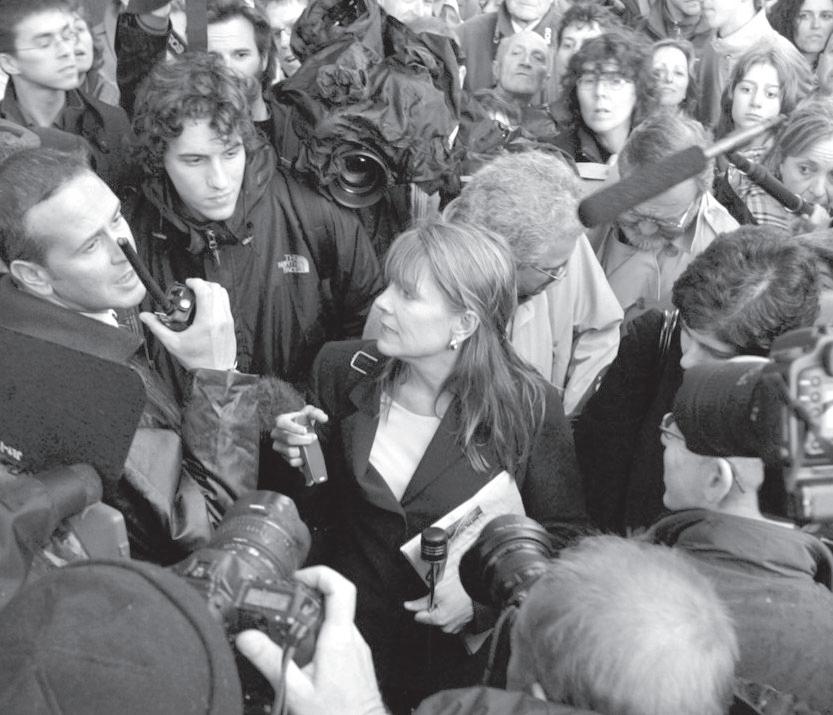
US dioceses. “We have to look at new ways of engaging both Catholics and the secular world,” said the federation’s president, Father Robert Silva of Stockton, California.
In workshops during the week, speakers called for a new openness about priestly life. Secrecy has led to tragedy, they said.
Older priests at a session on celibacy spoke up about seminary training in the 1950s and 60s, when sexual urges were treated with high caution. A young priest, 38-year-old Father Bill Holtzinger of St Anthony Parish in Forest Grove, Ore.gan, said Catholics tend to “super spiritualise”
priests and their sexuality, leaving it difficult to forge regular relationships.
In another workshop, Father Michael Papesh, pastor of Our Lady of Peace Parish in Minneapolis, said the Church has for too long “winked” at sexual and financial indiscretions by clergy. “Our winking signals a certain decay in the clerical culture as a whole,” he told priests.
The couple who lead the Christian Family Movement offered a workshop urging priests, despite the scandal, to stay involved with families, empowering them to minister to one another. The first step is hold-
ing gatherings involving food - potlucks, perhaps - said Peter and Jane Buchbauer of Winchester, Virginia. Once the couples and children get to know and like one another, they will want to do more together, including getting involved in parish ministries. “Your job is to identify leaders within the laity,” said Jane Buchbauer, a Catholic middle-school teacher.
Father Daniel Dahlberg of the Diocese of Superior, Wisconsin, affirmed that families often step forward for missions based on life experience. One couple in his parish who lost a child volunteered to lead a ministry for grieving parents.
A Chicago priest who ministers to young adults told the priests that amid increasing secularity in that age group, there is “amazing spiritual hunger.” For people in their 20s and 30s, mainline religion is “in the dumper,” but that does not mean they will not embrace a faith community sometime, said Father John Cusick. “If the conditions are right, we can turn this thing around,” he told fellow priests. The first step to take with those in that age group is to celebrate their moments of return to church, even when it is unwilling, as at weddings, baptisms and funerals. “We can make it a moment of grace,” Father Cusick said, adding that it is good to turn on the compassion before pulling out the legalism.
In a Mass at St Mary Cathedral, Portland Archbishop John G. Vlazny said many of the Church’s heroes have been priests. “Personal growth in holiness is always the Church’s No. 1 priority,” he said.
“We must never lose sight of the fact that our principal duty as pastors is to nurture our people in the ways of holiness,” he said. “Sometimes we are impeded from doing God’s work, as many of us are, or so it seems in our present perils, but we can still love God and love him in one another.” -CNS
Infants protected German youth excited about WYD
The US bishops’ pro-life spokeswoman praised the Department of Health and Human Services for its plans to “aggressively enforce federal laws that protect born-alive infants,” as US Health and Human Services Secretary Mike Leavitt announced on April 22.
“Roe vs. Wade may currently leave our country helpless to defend infants moments before birth, but even now we can and must protect those struggling for their lives outside the womb,” said Cathy Cleaver Ruse, director of planning and information for the bishops’ Secretariat for Pro-Life Activities.
“We applaud the Department of Health and Human Services for initiating this important and humane effort,” Ruse added in an April 22 statement. The department’s action followed the passage in August 2002 of the Born-Alive Infants Protection Act, which says that any infant who is fully born and shows signs of life is considered a human person entitled to the full protection of the law - even if the baby is born during a failed abortion. Leavitt noted that “Congress had received testimony that some infants who had been born alive after unsuccessful abor-
tions were left to die.”
He said his department would “investigate all circumstances where individuals and entities are reported to be withholding medical care from an infant born alive in potential violation of federal statutes” and “take proactive steps to educate state officials, health care providers, hospitals and child protection agencies about their obligations to bornalive infants under federal law. Ours is a society that values and defends life,” Leavitt said, pledging that his department would “continue to seek ways to revere and protect the dignity of life.”
In a separate statement on April 22, Ruse also expressed gratitude that a Senate vote to rescind the HydeWeldon Conscience Protection Amendment had been cancelled, reportedly because Senator Barbara Boxer, D-California, realised she did not have the votes necessary to overturn the provision. The amendment - named for Reps. Henry Hyde, R-Illinois, and Dave Weldon, R-Florida. - prohibits governmental discrimination against health care providers who choose not to provide or participate in abortions. -CNS
More than 800,000 young people are expected to join Pope Benedict XVI in his native Germany in August for World Youth Day, which will include private youth discussions with the newly elected pontiff, according to Church organisers.
“Although opinions differ about the fact that Cardinal Joseph Ratzinger is now Pope, most Germans will be happy and proud this is his first homecoming,” said Nina Schmedding, spokeswoman for World Youth Day in Cologne.
“It will take a long time to change attitudes in Germany to the Church - one papal visit won’t be enough. But it’s possible this could signal a new religious turning point,” Schmedding said in a telephone interview.
Pope Benedict announced his decision to attend World Youth Day at his April 20 Mass with cardinals in Rome.
In an April 19 statement, Mgr. Heiner Koch, World Youth Day secretary-general, said organisers were “filled with gratitude and joy” at a German Pope’s election, adding that it had pointed “the way for our Church.”
German Catholics gear up to meet new Pope at World Youth Day
He said he would travel to Rome in late April to make final preparations for the August 16-21 festival.
Schmedding said a Mass welcoming Pope Benedict would be held August 18 in Cologne’s 13thcentury Gothic cathedral. World Youth Day will conclude with an open-air vigil and Mass in the city’s Marienfeld suburb.
She said 220,000 young people ages 16-30 had already registered for World Youth Day, which was expected to attract at least 800,000 from 120 countries. She said a “central feature” of the festival would be meetings at which young people would have a chance to “talk directly” with the Pope in small groups.
“Benedict XVI has said he wants special contacts with the world’s youth - although he’s continuing John Paul II’s initiative, I think he’ll give this event his own special accent,” Schmedding said.
“It’s important for Germany to be the Church’s young face, and we
hope our country will be changed by this. Perhaps young people who have little interest in the Church will start participating again,” she said.
Up to 600 bishops and cardinals and 4,000 journalists are expected at World Youth Day, which will take place at 400 locations in the Cologne Archdiocese, as well as in nearby Bonn and Dusseldorf.
Organisers appealed on April 6 for 20,000 volunteers, as well as 1,320 team leaders and support managers to help with the festival.
Karsten Horn, spokesman for Cardinal Joachim Meisner of Cologne, said it was not yet known if Pope Benedict would travel to other German cities or if the trip to Cologne would be the new Pope’s first outside Italy.
“At present, everything is possible,” Horn told CNS. “Having a German Pope has created a new, special situation for us, and we’re very glad he’s accepted the invitation,” he said. CNS
Page 8 April 28 2005, The Record
Chicago resident Barbara Blaine, president and founder of Survivors Network of those Abused by Priests, or SNAP, surrounded by reporters in St Peter’s Square on April 11 at the Vatican. PHOTO: CNS
The World
Chinese bishop’s death shows divides
Bishop who headed Chineseapproved bishops’ conference dies at 82
Bishop Joseph Liu Yuanren of Nanjing, president of the government-approved Bishops’ Conference of the Catholic Church in China, died on April 20 in Beijing.
Bishop Liu, 82, who also served as vice chairman of the Chinese Catholic Patriotic Association, died of liver cancer.
He had been hospitalised since early February, Anthony Liu Bainian, an association vice chairman, told UCA News, an Asian Church news agency based in Thailand.
The obituary issued by the two organisations praised Bishop Liu for maintaining independence, autonomy and self-support while facing pressures from outside China.
Funeral arrangements have not been finalised, pending the arrival in Beijing of Church representatives from Nanjing Diocese and of the prelate’s relatives, Liu said.
A Church source in Beijing told UCA News the funeral Mass would be held on April 25 or 26.
Bishop Liu’s body will be cremated before being returned to Nanjing; after a Mass in Nanjing, his ashes will be buried in Wuxi, where the late bishop used to do pastoral work as the dean of par-
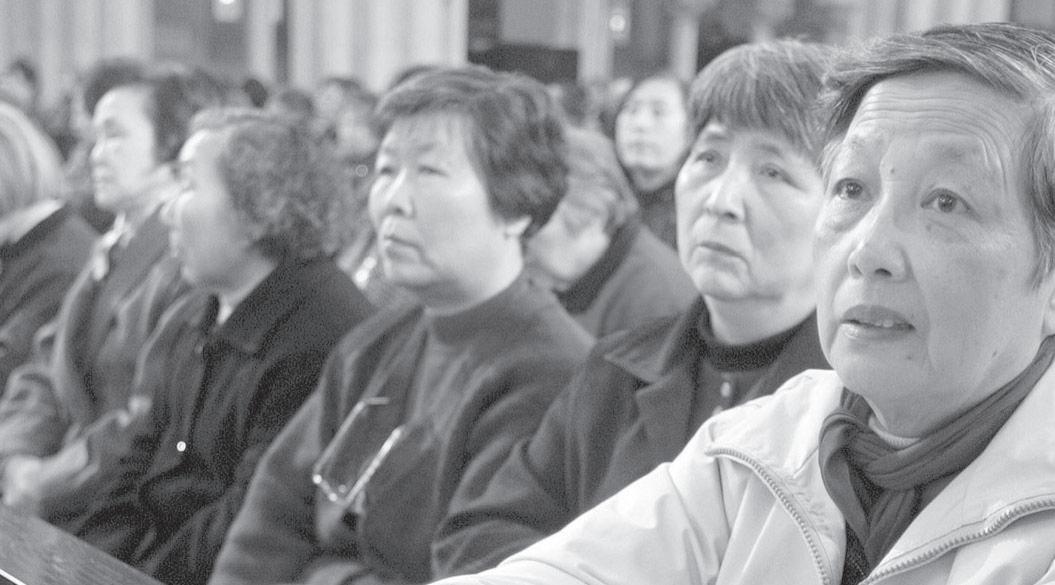
ishes, the source said.
Anthony Lam Sui-ki, senior researcher of the Hong Kong Diocese’s Holy Spirit Study Centre, told UCA News that Bishop Liu was “a very good priest who was humble and low-profile and fervent in praying.”
Lam, who knew the late prelate since 1983, said, “Bishop Liu was weak in defending Church values and principles and compromised easily.”
He said interventions by the
local Catholic patriotic association in the 1980s hindered then-Father Liu’s pastoral work. Managing the Nanjing Diocese was “too heavy a burden” for the priest because the local government pressured officials to make it appear as if the diocese were flourishing, but there were too few Catholics and vocations to achieve that goal, he said. Father Liu moved to Beijing in 1991 to serve as vice rector of the national seminary.
Two years later, he was ordained
bishop of Nanjing. In 1998 he was elected president of the governmentapproved bishops’ conference. On January 6, 2000, Bishop Liu presided in Beijing at the ordination of five bishops without apostolic mandate. The event occurred hours before Pope John Paul II ordained 12 bishops at the Vatican; it was described by Chinese Church-watchers as a confrontation with the Vatican. A few months later, on June 24, the Holy See said in a statement that an episcopal ordination with-
China requests Vatican cut off relations with Taiwan
With the election of Pope Benedict XVI, a Chinese official reiterated the government position that China is willing to improve diplomatic relations with the Vatican only if the Vatican cuts off relations with Taiwan.
Qin Gang, spokesman for the country’s Ministry of Foreign Affairs, said in an April 20 statement that the Vatican must acknowledge that “the People’s Republic of China is the sole legal government representing the whole of China, and Taiwan is an indispensable part of China,” reported UCA News, an Asian church news agency based in Thailand.
the world in brief
Pope Benedict a gift
Qin also reiterated the Chinese stance that the Vatican should avoid interfering in China’s domestic affairs in the name of religion.
“We hope that the Holy See, under the leadership of the new Pope, will create favourable conditions for normalisation of ChinaHoly See relations,” Qin said.
The brief statement made no mention of Taiwanese President Chen Shui-bian’s attendance at the April 8 funeral for Pope John Paul II, a move that reportedly angered Chinese officials.
The Chinese Catholic Patriotic Association and the Bishops’ Conference of the Catholic Church
The Vatican nuncio to the United Nations described the election of Pope Benedict XVI as a “gift of moral authority.” Delivering the homily on April 25 at a Mass of thanksgiving for the installation of the new Pope, Archbishop Celestino Migliore said that only God “and not any particular human being is at the centre of our worship.”
But the leader of a religious community is able “to promote, to support and to guarantee” communion between believers and God, and preserve the “fundamental values of society,” he said.
The Mass, which drew a congregation of diplomats and others, was held in New
in China sent a congratulatory message to the Holy See. They also sent a notice asking all dioceses to pray that the new Pope would have wisdom and spiritual and physical health, UCA News reported. The notice to dioceses also calls for the Holy See to sever diplomatic relations with Taiwan and for improved China-Holy See relations, reported UCA News.
Association vice chairman Anthony Liu Bainian said two government-sponsored Church bodies oppose Chen’s promotion of a “one China, one Taiwan” policy.
In Taiwan, church and government officials downplayed the sig-
York at Holy Family Church, whose parish bounds include the United Nations and numerous national UN missions and UNrelated agencies.
The challenges ahead
Even before they knew Cardinal Joseph Ratzinger would become Pope Benedict XVI, US national Catholic newspapers and magazines outlined a massive array of challenges they say he will face in coming years as the global leader of 1.1 billion Catholics. Islam, secularism in the West, women in the Church, the priest shortage, sexual morality (or lack of it), Christian unity and styles of Church governance were among issues the national media raised.
In the April 24 issue of Our Sunday Visitor,
nificance of Chen’s presence at Pope John Paul’s funeral, saying the president was there to pay respects to the late pontiff on behalf of Taiwan’s 23 million people.
Tou Chou-seng, Taiwan’s ambassador to the Holy See, told UCA News, “The objective of President Chen’s trip was very simple, as he has always felt great esteem for the late Pope and has always cherished and often answered his appeals in important international affairs.”
China refuses to have diplomatic relations with any country that extends diplomatic recognition to Taiwan, which has no official diplomatic mission in Europe other
Russell Shaw, who was press secretary to US cardinals in the two 1978 conclaves, listed declining vocations to the priesthood and religious life at the top of internal Church crises the new Pope will face. An April 13 editorial in the national Catholic weekly magazine America also put the priest shortage at the top of its list of internal issues and said, “The time for denial is over. ... A Church without sacraments is not Catholic. ... Providing the Eucharist and other sacraments to the Catholic community is more important than mandatory celibacy.
Tithing the easy way
Both churchgoers and Churches say they are benefiting from a service that allows people to have their weekly offering deduct-
out apostolic mandate is “a painful wound to ecclesial communion and a serious violation of canonical discipline.” It said such moves by China were placing “ulterior obstacles on the path of normalisation” of church life and of relations between Beijing and the Holy See.
Bishop Liu was born March 16, 1923, in Qidong to a family that had been Catholic for five generations. He was ordained a priest in Shanghai in 1953 and taught afterward at a minor seminary in Haimen. The government-approved Chinese Catholic Patriotic Association was formed in 1957 to bring the Church in line with communist goals and to separate the Church from “foreign interference,” such as ties with the Vatican.
An underground Church continued to exist and face persecution.
Bishop Liu spent 1959-78 in reform-through-labour because of his faith. With the death of Bishop Liu and three other bishops in the government-approved Church since January this year, the number of bishops in the governmentapproved conference now stands at 66. In recent years, Church leaders in Hong Kong have said two-thirds of the bishops belonging to the patriotic association have reconciled secretly with the Vatican. The Chinese Church kept alive the line of apostolic succession with ordinations by validly ordained bishops. -CNS
than the mission to the Holy See. Worldwide it has relations with only 25 states.
Since the Vatican has no airport, Chen had to land in Italy and travel by road to attend the funeral, and the Italian government issued the Taiwanese president a visa for this.
Archbishop Joseph Cheng Tsaifa of Taipei told UCA News that the president’s trip was low-profile as the Holy See had to consider the feelings of Catholics in mainland China.
“Overinterpretation of the political significance of the president’s trip would arouse misunderstanding,” he cautioned. CNS
ed electronically by debit or credit card, instead of them having to put money into the collection basket at Mass, according to a survey by ParishPay.
The New York-based company describes itself as “the largest religious donation and tuition handling organisation in the country.” In its survey, 98.7 percent of the 1,000 respondents said they would recommend ParishPay to others and 96.4 percent said ParishPay is much better than collection envelopes.
ParishPay’s sister companies, InTuition and Appeal Advantage, operate as a school’s tuition collection office and handle a parish’s capital giving campaign, respectively.
April 28 2005, The Record Page 9
CNS
Catholics pray at the state-sanctioned St Ignatius Cathedral in Shanghai, China, on April 3. Chinese Catholics, forbidden by their communist rulers from recognising the Holy See, mourned the April 2 death of Pope John Paul II. PHOTO: CNS
Understanding what cardinals are
dear padre
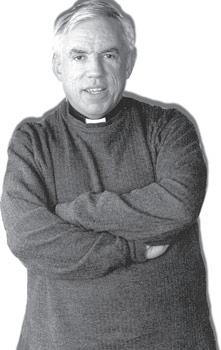 ■ With Fr Timothy Deeter
■ With Fr Timothy Deeter
Question: The recent papal funeral and subsequent conclave highlighted the role of the College of Cardinals. What is this ‘college’, what is a cardinal, and how does one become a cardinal?
Anumber of people have asked me the same questions. Some have even asked when I am going to become a cardinal myself (as if!). Naturally, there’s a bit of history involved in the answer, so
let’s dig in. In early centuries, the popes – as bishops of Rome – were elected by the local clergy and laity of Rome.
In fact, all bishops were elected by their dioceses, and the names of those chosen sent to Rome for confirmation.
However, these elections were often tainted by politics. Campaigning, promise-making, and even rioting between opposing factions caused the Church to limit the elections to voting by the clergy only.
To this day, the clergy are involved in the appointment of bishops, but usually through consultation only and not by voting.
Getting back to Rome, the custom of the Roman clergy electing the Pope was maintained, even as the Church spread far and wide beyond Rome’s confines, through an ingenious system that developed as the Church expanded.
First, the dioceses established in Rome’s suburbs – Ostia, Albano, Palestrina, Porto, Silva Candida, Gabii and Veletri – were headed by bishops who directly assisted the bishop of Rome in administrative
duties. Thus the pope kept in touch with the surrounding dioceses.
Next, the diocese of Rome itself was divided into four main sections, each one under the direction of a major basilica – St Peter’s, St Paul’s, St Mary Major’s, and St Lawrence’s. Each section of the diocese was divided into seven parishes called ‘title churches’ because the priest was ‘entitled’ with certain rights and duties, and called a ‘cardinal priest’.
These cardinal bishops and priests were the principal counsellors and assistants of the popes. They would meet on a regular basis to advise the popes; the Latin word for such a gathering for discussion is collegium – thus, the ‘College of Cardinals’.
In 1059, the election of the pope was restricted to this College as representative of the clergy of Rome.
By 1084 there were seven permanent deacons working in Church administration who were also designated with the title ‘cardinal’.
The term ‘cardinal’ comes from the Latin cardus, which means a door hinge. Pope Eugene IV (d. 1447) said, ‘As the door of a house turns on its hinges, so the Apostolic
The wasteland of The West
■ By Hugh Ryan
On Monday morning last week, as the Cardinals prepared to elect a new Pope, The West Australian published in an editorial headed “Cardinals at conclave must accept the need for change,” its own prescription to change the Church.
It is odd that The West Australian thinks it knows how to be the Catholic Church better than the Church herself does, but it is even odder that its prescription for reform has nothing to do with the main work of the Church, which is to preach the Gospel to every creature (even newspaper editors) and to make people aware of the joyful wonder that is the love of God.
What is sad is that the prescription for ‘reform’ is a classic case of denial of what is happening in our own society.
The list begins with contraception, described as an edict of the late John Paul II. Actually, this teaching has been constant in the Church since its foundation and constant in the scriptures extending much further back than that.
This was so until most other Christian denominations followed the Anglican example from 1930 onwards, either by decision or by drift, so that when the contraceptive pill was put on the market at the beginning of the sixties the drug companies found a market well prepared. The community was promised by drug companies and the media that the pill would bring about happier and more loving marriages, fewer divorces. stronger families, better lives for children, fewer unplanned pregnancies, and no abortions.
Instead, we experienced the socalled sexual revolution, spiraling infidelity and the complete reversal of all those promises.
■ The divorce rate over the last 35 years has been at levels beyond anyone’s imagining 45 years ago. The failure rate of marriage has been so bad that large numbers of young people lack the confidence to marry and casually cohabit, which is damaging for them and
any children they have.
■ There have been fewer children but they are not happier; hundreds of thousands of them spend their lives separated from one or both parents because of divorce or separation of cohabiting couples, and inability to live with second and third ‘partners’.
■ Fertility rates are such that almost no country in the Western world, and certainly not Australia, now reproduces itself.
■ Abortion rates spiraled, and now, right here in WA, for every three children born the community pays doctors a small fortune to kill one. On top of that, we now allow people to conduct destructive experiments on living human embryos.
■ Large numbers of children do not receive the additional parental love and attention that was promised by the drug companies, but instead are cared for by strangers in child care centres from very early in life.
■ Teenage pregnancies abound, and the rate of teenage sexually transmitted diseases is among the worst in the developed world.
■ The rates of suicide and attempted suicide among the young have been at historically high levels for the last 30 yeas or so. There have been endless studies over the last 40 years that confirm that stable marriage is the best environment for adults and children.
In areas like health, wealth, happiness, education, achievement of potential, and even their own happiness in marriage, the children of intact families on average do better than those of divorced or nevermarried parents, and the adults in stable marriages do better, too.
In negative aspects like underachievement, mental and physical ill-health, involvement in crime as perpetrators or victims, child abuse, and domestic violence, the children, and adults, of divorce are at much greater risk.
And one last thing, Catholics who use contraception have about
See, which is the door of the whole Church, rests and finds support on the cardinals.’
Another derivation of the term comes from the fact that the popes began appointing bishops of various dioceses far from Rome as advisors.
To allow them to participate in papal elections, these bishops were ‘incardinated’ or attached to one of the Roman title churches as honorary pastors.
In our time, the College of Cardinals is still divided into three orders. The cardinal bishops are still the bishops of the suburban dioceses mentioned above. The cardinal bishop of Ostia is given the privilege of installing a newlyelected pope.
Cardinals from other places in the world are usually archbishops of dioceses that are pre-eminent in a region due to their size or their history (Sydney qualifies on both counts).
These cardinals, even though they are bishops, are appointed cardinal priests, and they are made honorary or ‘titular’ pastors of parish churches in Rome.
Finally, the prefects or heads of the principal departments of the Vatican, even though they are usually archbishops, are often appointed cardinal deacons. The chief of these is named the Dean of the College of Cardinals. It is he who has many administrative responsibilities in the event of the death of a pope.
Not all cardinals are bishops; there are several who have chosen to remain simple priests, yet they are special advisors to the Pope. It is the Holy Father himself who appoints cardinals, and it is they alone who elect his successor as the representatives – real or titular – of the Roman clergy.
There are some who have suggested that we return to the practice of democratically electing bishops and even popes.
However, given the campaigning and politicking that goes on in government elections – with their attendant high expenses, namecalling and broken promises – I think I’d rather leave the system the way it has developed. It seems to work pretty well!
the same divorce rate as the rest of the community, while those who trust in God or use natural family planning have a divorce rate that is virtually non-existent.
Marriage is a positive social good. The best preparation for marriage is commitment to chastity beforehand and fidelity afterwards, but our young are not taught the truth about such things.
Far from acknowledging the tragedy, The West Australian wants the Church to change its ways and endorse all of the family destruction that has arisen.
The paper even had the audacity to repeat the claim that “the death toll from AIDS continues to rise, in part because of the Church’s refusal to endorse the use of condoms to prevent its spread”. But the Church’s only objection to condoms is that they are a contraceptive; and that has nothing to do with homosexuality. Nobody dies of AIDS or any other sexually transmitted disease by following the Church’s teaching on AIDS. Both Uganda and Thailand have proved in the last decade that campaigns for abstinence before marriage and fidelity in marriage dramatically reduce AIDS rates; where nations rely on condoms AIDS continues to spread.
Who or what is responsible for the great majority of such deaths?
The answer is the promiscuity, prostitution and homosexuality
The West Australian wants the Church to approve. The pre-conclave editorial was a classic case of denial and blind insistence that the one force standing out against the tide of destruction should abandon its principles. It won’t happen. The new Pope will remember, as his predecessors have done, that Jesus said: “He who hears you, hears me; he who rejects you rejects me; and he who rejects me rejects the one who sent me.” (Luke 10:18)
He will ensure that the voice we hear will be that authentic voice. Catholics would do well to remember those words instead of being led astray by our persistent but misguided media.
Bishops to talk with Perth youth
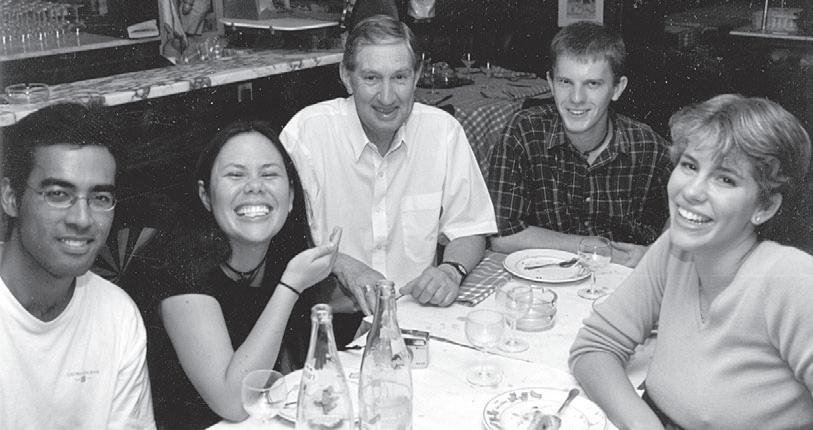
Continued from page 1
Priests would be invited to attend, but only as observers so they could hear what the Archbishop hears.
In his letter of invitation, which was issued this week, Archbishop Hickey said one of the most welcome signs of the action of the Holy Spirit in recent times had been the appearance of very enthusiastic youth movements in the Church worldwide.
“The appeal of Jesus Christ is perhaps even greater now in our very materialistic and secular culture,” he said.
“I have previously had consultations in which I answered young people’s questions, but I have often felt the need to meet a cross-section of young people to understand better their world and their spiritual outlook.
“Now I am calling them together to get their advice about my priorities as Archbishop, especially in regard to young people and young families.”
The topics to be put before young people for their consideration and advice would be:
● What do you expect from your Archbishop and Bishop as Teacher and Shepherd?
● What challenges emerge
from a statistical snapshot of the Archdiocese to be provided?
● How best can we attract vocations to the priesthood and religious life?
● What do young people want in the area of lay formation?
● How can we reach out to Catholics who are far from the Church? And Catholics alienated from the Church?
● What other matters do you wish to draw to my attention?
The young people would not be expected to provide answers to the challenges they raised, though answers would be welcome, and they would not be expected to commit themselves to ongoing activities.
“This is about insights and advice for me and Bishop Sproxton,” the Archbishop said.
The sessions would be conducted at Como-Kensington Parish Hall in Thelma St, Como, from 6pm to 9.30pm, with a light supper provided. The first two sessions would be on Tuesdays May 17 and 24, and the third would be on May 31 if the momentum of the group warranted it.
“I am looking forward to hearing what the young Church has to say,” Archbishop Hickey said.
Page 10 April 28 2005, The Record
Archbishop Hickey spends time with young people on the way to World Youth Day, 2002.
Photo: Derek Boylen
HEALTH BOOK KEEPING
■ MYOB MY OFFICE OR YOURS
Ph: Margaret 9459 5866/0403 778 426
BUILDING TRADES
■ BRICK REPOINTING
Phone Nigel 9242 2952
■ HANDYPERSON
Home maintenance good rates. Phone Adrian 9343 9025
■ GUTTERS/DOWNPIPES
Need renewing, best work and cheapest prices. Free quote. Ph: Ad 9447 7475 or 0408 955 991 5008.
■ PERROTT PAINTING PTY LTD
For all your residential, commercial painting requirements. Phone Tom Perrott 9444 1200.
■ PICASSO PAINTING
Top service. Phone 9345 0557, fax 9345 0505.
■ RESPITE OR LONG STAY
Respite or long stay. I am a qualified carer and have vacancies in my home for frail and aged. Twenty-four hour care. Further information and brochure please contact 9397 7037 mob. 0402 265 952.
CATHOLICS CORNER
■ RETAILER OF CATHOLIC PRODUCTS Specialising in gifts, cards and apparel for baptism, communion and confirmation. Ph: 9456 1777. Shop 12A, 64-66 Bannister Road, Canning Vale. Open Mon-Sat.
CHANGE YOUR LIFE FOREVER
■ WORK FROM HOME
Around your children & family commitments. My business is expanding and I need people to open new areas all over Australia. Training given. Highly lucrative. www.cyber-success-4u.org
CHURCH ORGAN
■ SEEKING CHURCH ORGAN
In good condition at a reasonable price.
Anyone with information please call Fr
Tomasz 9272 2154 or 0411 286 812
EMPLOYMENT
■ CARETAKER FOR COUNTRY CHURCH
Accommodation available would suit pensioner situated 1 hour from Perth. Ph: Fr Paul 9571 1839
FURNITURE REMOVAL
■ ALL AREAS
Mike Murphy 0416 226 434.
2pm including Healing Mass on Fridays at 12.30pm during term. Weekday Rosary at 12.30-1pm. Our new address is 4 Preston Point Road, East Fremantle behind Immaculate Conception Parish.
Saturday April 30
MOVEMENT PRESENT
FAMILYFEST LOVE BUILDS PEACE
To be held at the main hall at the Little Sisters of the Poor, 2 Rawlings St Glendalough, commencing at 10.30am and concluding at 4.30pm. Entrance is free, food and drinks will be on sale. Enq Focolare 6278 3425 or 9349 4052
Sunday May 1
FAREWELL FOR THE SISTERS OF ST JOSEPH
St Joseph’s Parish, Northam, cordially invites all interested people to attend a Farewell Mass for the Sisters of St Joseph of the Apparition who are leaving Northam at the conclusion of 116 years service. Mass will be from 11am in St Josephs Church. Light refreshments will be available at the conclusion of Mass. Please advise Mrs Carol Leeder 0429 339 986 if you are able to attend.
Sunday May 1
MERCEDES COLLEGE FETE
Live music all day, giant silent auction, craft and gourmet basket stalls, food and bar area with AFL tent. Rides and entertainment for the whole family. Between 10.30am and 4pm at Mercedes College Victoria Square Perth.
Monday May 2
The Legion of Mary will be offering a Mass in Thanksgiving and Celebration for the Life of His Holiness Pope John Paul II. The Mass will be concelebrated by Fr Jim Shelton and the Spiritual Directors of the Legion at St Francis Xavier Church Windsor St East Perth. Mass will be commencing with the Rosary at 7pm. Members of the Legion are invited to attend. Enq Rosemary Bennett on 94547831.
■ GLYCONUTRIENTS
Now here is a product that could change your life, a dietary supplement that surpasses all others. Glyconutrients are a technological breakthrough and a new area of science. Learn more about optimal health and Glyconutrients by calling: Mary Anne 9284 1662. Find out Glyconutrients can provide you with a healthy business and a healthier life.
■ DENMARK
Holiday House 3bdr x 2bth, sleeps up to 8. BOOK NOW. Ph: Maria 0412 083 377
■ DUNSBOROUGH
4 x 2, great location, sleeps 9. Ph: 0414 579 215
MUMS ON A MISSION
■ SUCCEED FROM HOME Call Christine on Tel: 9256 2895
RELIGIOUS PRODUCTS
■ APARACIDA'S CAFE EMPORIUM
Delicious meals, unique giftware for all occasions. Regular workshops and seminars, catering for office and other groups, giftware for schools, parishes, individuals. Ph: 9470 1423, 0414 624 580, email: aparacidas@myaccess. com.au
Classified call Eugene on 9227 7778
Humour
Two bats wake up in the middle of the night. One says, “Let’s fly out of the cave and get some blood.”
“We’re new here,” says the second one. “It’s dark out, and we don’t know where to look. We’d better wait until the other bats go with us.”
The first bat replies, “Who needs them? I can find some blood somewhere.” He flies out of the cave.
When he returns he is covered with blood. The second bat says excitedly, “Where did you get the blood?”
The first bat takes him to the mouth of the cave. Pointing into the night, he asks, “Seek that black building over there?” “Yes,” the other bat answers, “Well,” says the first bat, “I didn’t.”
Sunday May 1
ETERNAL WORD TELEVISION NETWORK: 1 2 PM ON
ACCESS 31
Habemus Papam, We have a Pope, EWTN news
Special Report from the Vatican hosted by Raymond Arroyo and Fr Richard Neuhaus, with guests, including Cardinal George Pell. Videotapes and DVDs of key events, including the Installation Mass of our new Holy Father, are available on request. Postal address: The Rosary Christian Tutorial Association , PO Box 1270, Booragoon 6954. Enquiries: 9330 1170.
Tuesday May 3
COMBINED LITURGICAL MINISTRY WORKSHOP NO 1
Workshops include Musicians, Art & Environment and Forming Liturgy Committees. Commencing from 7.30pm - 9.30pm. RSVP Friday 29 April to the Archdiocesan Liturgy Office, 40/A Mary Street, Highgate WA 6003. Phone: 9422 7902, Fax: 9328 2833, Email litrcia@highgate-perthcatholic.org.au
Friday May 6
ALLIANCE AND TRIUMPH OF THE TWO HEARTS
All night vigil of Eucharistic Adoration in reparation to the United Hearts of Jesus and Mary at Saint Bernadette Church, Jugan Street, Glendalough, Commences 9pm with Holy Mass. Hourly Rosaries, hymns and prayers. Concludes with parish Mass at 7.30 am Saturday. Enq 9444 6131 / 9342 5845
Friday May 6-7
VIGIL MASS ALL SAINTS CHAPEL
Devotions to the Sacred and Immaculate Hearts, commencing Friday 9pm with Mass, Rosaries, hymns on the hour and concluding Saturday with Mass at 7am, all welcome. Tea and Coffee provided. Enq 9409 4543
Sunday May 8
EUCHARIST
We welcome you to celebrate the Eucharist in honour of Blessed Mary MacKillop on the 8th of each month at 6pm with the exception of May at 9am, at our Convent Chapel, 16 York St, South Perth. Enq Sister Maree 93340933
Saturday May 28
MAY QUEEN BALL
From 7.30 to 12.30am to fund raise for Holy Family church Maddington. It will be held at Maddington Community Centre (corner of Yule & Alcock Street) For more information contact Francis Williams 9459 3873, 9493 4287, 0404 893 877 francis@perthfamily. com
Friday June 3-5
HOLY SPIRIT OF FREEDOM COMMUNITY ANNUAL CONFERENCE FOR THE BUNBURY DIOCESE
Will be held in Pemberton, the conference theme is “Living Flame Transforming Love” and all are invited to be a part of this Festival of Praise and Worship. For more details, bookings and accommodation alternatives contact Lisa on 9776 0323 or Connie on 9776 1092.
Saturday May 7
DAY WITH MARY
At St Catherine’s, Gingin 9am to 5pm. For bus bookings contact Nita 9367 1366. Franciscans of the Immaculate.
Tuesday May 10
THE HEARTS ARE BURNING FORUM
This forum will take place in Perth at Wesley Auditorium corner Hay and William Streets Perth at 6.30pm. Indigenous Church leaders will promote a deeper understanding of the current state of Indigenous affairs in Australia today. Entry by donation. All welcome. Enq. Terry Quinn Catholic Social Justice Council 9422 7926
Friday May 13
FEAST OF OUR LADY OF FATIMA
The annual celebration will be held at St Patrick’s Basilica, Fremantle commencing at 7pm with Solemn Mass, Sermon, Procession and Benediction. All welcome
Sunday 15 May
PENTECOST SUNDAY CATHOLIC CHARISMATIC RENEWAL PERTH
Will be conducting an afternoon of worship & praise in honour of the Feast of Pentecost. Mass will be celebrated with main celebrant, Bishop Don Sproxton,
who will also present the homily. A finger food supper will follow. It will be held at St’s John and Paul Parish, Pinetree Gully Road Willeton from 4pm to 8pm Please bring a plate of finger food, and a drink to share.
Sunday 15 May
MULTICULTURAL FOOD FAIR
Our Lady of Assumption School Hall, 356 Grand Promenade, Dianella 7.30am to 4pm. Ample parking available between the Caltex garage and the Church. Huge range of multicultural food, refreshments and cultural floorshows. All welcome. Enq Lorraine 9571 1815, Pat 9571 1438, Lisa 9296 4781. Proceeds will go to St Catherine’s Gingin.
CONFRATERNITY OF THE HOLY SPIRIT
The Confraternity of the Holy Spirit has been sanctioned in the Perth Archdiocese, our aim is to make the Holy Spirit known and loved, and to develop awareness of His presence in our lives. If you would like more information please call WA Coordinator Frank Pimm on 9304 5190.
SECULAR FRANCISCANS IN WA
You are invited to find out more about following Franciscan way of life as a layperson. Contact the group nearest you and come along. Midland fraternity meets on the second Friday of each month at 1pm, contact Mary 9377 7925. Balcatta fraternity meets on the third Sunday of each month at 3pm contact Dunstan 9276 9415. Perth fraternity meets on the fourth Sunday of each month at 2.30pm contact John 9385 5649. Dardanup fraternity meets on the third Sunday of each month at 1.30pm contact 9721 6815.
CATHOLICS EXPERIENCING THE BIBLE
An exciting opportunity to learn more about your faith. Enrolments are now open for study at ‘Acts2come’ Catholic Bible College. Subjects include Bible Timeline, Theology of the Body, Acts of the Apostles, Spiritual Gifts, Life Skills, Christian Virtues in a Post-modern Society and Catholic Ethics. Day, evening, and part-time courses are available. Enq Jane Borg on 9202 6859
Ministries Mass at St Charles’ Seminary - Archbishop Hickey
and opening of extensions at St Mary’s School, Kalgoorlie - Bishop Sproxton
Familyfest at Little Sisters of the Poor, Glendalough - Bishop Sproxton
Farewell Mass, Sisters of St Joseph of the Apparition, Northam - Archbishop Hickey RCIA Mass, Lockridge - Bishop Sproxton 2-12 Australian Catholic Bishops’ Conference, Sydney - Archbishop Hickey, Bishop Sproxton
Blessing of extensions at St Maria Goretti School, Redcliffe - Fr Brian O’Loughlin VG 8 Confirmation, City Beach - Mgr Thomas McDonald 9 Ecumenical Church Service commencing Law Week 2005, St George’s Cathedral - Fr Brian O’Loughlin VG 11 Confirmation, Ursula Frayne College (at East Victoria Park Parish) - Fr Brian O’Loughlin VG April 28 2005, The Record Page 11 Classifieds Classified ads: $3.30 per line incl. GST 24 hour Hotline 9227 7778 Deadline: 5pm Tuesday ADVERTISEMENTS PANORAMA a roundup of events in the archdiocese OFFICIAL DIARY 26th April to 1st July CROSS ROADS COMMUNITY TERM 2 Family & Friends Support Groups of Substance Abusers on Wednesdays 7pm–9pm, Substance Abusers Support Groups on Tuesdays 5.30–7.30pm & Fridays all day Group for Substance Abusers 9.30am–
APRIL 29
Blessing
30
MAY 1
6
FOCOLARE
HOLIDAY ACCOMMODATION
New
CARER
To
place a
The Last Word Abandonment to Divine Providence the key
Here is a translation of Pope Benedict XVI’s first fulllength message, which he read in Latin at the end of a Eucharistic concelebration with members of the College of Cardinals in the Sistine Chapel on April 20.
Venerable Brother Cardinals, Dear Brothers and Sisters in Christ, Men and Women of Good Will!
1. May grace and peace be multiplied to all of you (cf. 1 Peter 1:2)! In these hours, two contrasting sentiments coexist in my spirit. On one hand, a sense of inadequacy and of human anxiety before the universal Church, because of the responsibility that was entrusted to me yesterday as Successor of the Apostle Peter in this See of Rome. On the other hand, I feel very intensely in myself a profound gratitude to God who - as we sing in the liturgy - does not abandon his flock, but leads it through the times, under the guidance of those whom he himself has chosen as vicars of his Son and has constituted pastors (cf. Preface of the Apostles I).
Beloved, this profound gratitude for a gift of the divine mercy prevails in my heart despite everything. And I consider it in fact as a special grace obtained for me by my venerable Predecessor, John Paul II. I seem to feel his strong hand gripping mine; I seem to see his smiling eyes and to hear his words, addressed at this moment particularly to me: “Be not afraid!”
The Holy Father John Paul II’s death, and the days that followed, were a time of extraordinary grace for the Church and for the entire world. The great sorrow of his death and the sense of emptiness that it left in everyone were tempered by the action of the risen Christ, which was manifested during long days in the unanimous wave of faith, love and spiritual solidarity, culminated in his solemn obsequies.
We can say it: John Paul II’s funeral rites were a truly extraordinary experience in which in some way the power of God was perceived that, through his Church, desires to make of all peoples a great family, through the unifying force of Truth and Love (cf. “Lumen Gentium,” No. 1). At the hour of death, conformed to his Teacher and Lord, John Paul II crowned his long and fruitful pontificate, confirming the Christian people in the faith, gathering them around himself and making the entire human family feel more united. How can we not feel supported by this testimony? How can we not perceive the encouragement that comes from this event of grace?
2. Surpassing all my expectations, Divine Providence, through the vote of the venerable Cardinal Fathers, has called me to succeed this great Pope. I reflect again in these hours on all that occurred in the region of Caesarea Philippi, some 2,000 years ago. I seem to hear Peter’s words: “You are the Christ, the Son of the living God,” and the Lord’s solemn affirmation: “You are Peter, and on this rock I will build my Church ... I will give you the
keys of the kingdom of heaven”
(Matthew 16:15-19).
You are the Christ! You are Peter! I seem to relive the same evangelical scene; I, Successor of Peter, repeat with trepidation the anxious words of the fisherman of Galilee and I hear again with profound emotion the reassuring promise of the divine Teacher. If the burden of responsibility that is placed on my poor shoulders is enormous, exceeding is as well the divine power which I can count on: “You are Peter, and on this rock I will build my Church” (Matthew 16:18). In choosing me as Bishop of Rome, the Lord has desired me to be his Vicar, he has desired me to be the “rock” on which all can lean with security. I ask him to make up for the poverty of my strength, so that I will be a courageous and faithful Shepherd of his flock, always docile to the inspirations of his Spirit.
I prepare to undertake this peculiar ministry, the “Petrine” ministry at the service of the universal Church, with humble abandonment in the hands of the Providence of God. In the first place it is to Christ that I renew my total and faithful adherence: “In Te, Domine, speravi; non confundar in aeternum!”
To you, Lord Cardinals, with a
her hands the Gospel, applied to the present world through the authoritative rereading of the Second Vatican Council. Pope John Paul II indicated the Council precisely as a “compass” with which to orient oneself in the vast ocean of the third millennium (cf. apostolic letter “Novo Millennio Ineunte,” Nos. 57-58). In his spiritual testament he noted: “I am convinced that the new generations will still be able to draw for a long time from the riches that this council of the 20th century has lavished on us” (17.4.2000).
Therefore, in preparing myself also for the service that is proper to the Successor of Peter, I wish to affirm strongly my determination to continue the commitment to implement the Second Vatican Council, in the footsteps of my Predecessors and in faithful continuity with the 2,000-year tradition of the Church. This year in fact will be the 40th anniversary of the conclusion of the conciliar sessions (Dec. 8, 1965). With the passing of the years, the conciliar documents have not lost their current importance; on the contrary, their teachings reveal themselves particularly pertinent in relation to the new needs of the Church and of the present globalized society.
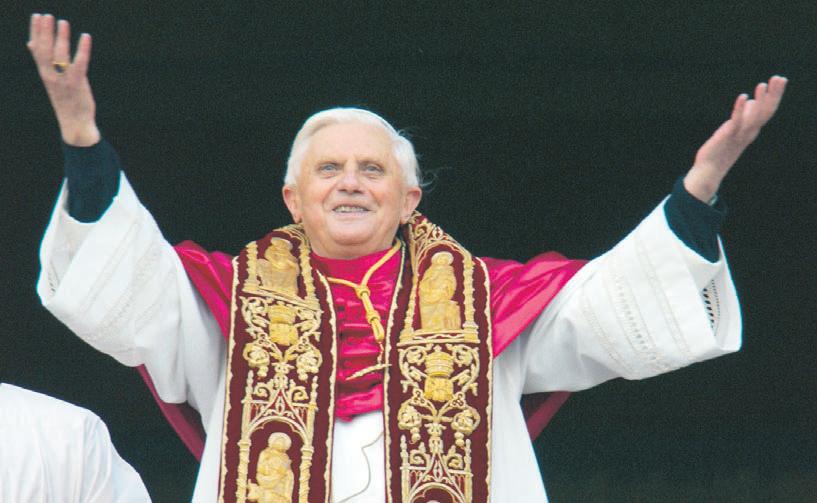
grateful spirit for the trust shown to me, I ask that you support me with prayer and with constant, active and wise collaboration. I ask also all brothers in the episcopate to be by my side with prayer and counsel, so that I can truly be “Servus servorum Dei.” As Peter and the other apostles constituted, by the will of the Lord, a unique Apostolic College, in the same way the Successor of Peter and the bishops, successors of the apostles, must be very closely united among themselves, as the Council confirmed forcefully (cf. “Lumen Gentium,” No. 22).
This collegial communion, though in the diversity of roles and functions of the Roman Pontiff and of the bishops, is at the service of the Church and of unity in the faith, from which depends in notable measure the efficacy of the evangelising action in the contemporary world. Therefore, I wish to continue on this path on which my venerated Predecessors advanced, concerned only to proclaim to the whole world the living presence of Christ.
3. I have before me, in particular, the testimony of Pope John Paul II. He has left a more courageous, free and young Church. A Church that, according to his teaching and example, looks with serenity to the past and has no fear of the future. She was led into the new millennium with the Great Jubilee, carrying in
over the next months their love and devotion to Jesus in the Eucharist and to express in a courageous and clear way their faith in the Lord’s real presence, above all through the solemnity and correctness of the celebrations.
I ask this in a special way of priests, whom I am thinking of at this moment with great affection. The ministerial priesthood was born in the Cenacle, together with the Eucharist, as my venerable Predecessor John Paul II underlined so many times. “The life of a priest [must] be ‘shaped’ by the Eucharist,” he wrote in his last letter for Holy Thursday (No. 1). To this purpose contributes first of all the devoted daily celebration of the Holy Mass, centre of the life and mission of every priest.
5. Nourished and sustained by the Eucharist, Catholics cannot but feel stimulated to tend to that full unity that Christ so ardently desired in the Cenacle. The Successor of Peter knows that he must take charge in an altogether particular way, of this supreme longing of the divine Teacher. To him in fact has been entrusted the task of confirming the brethren (cf. Luke 22:32).
Fully conscious, therefore, at the beginning of his ministry in the Church of Rome, which Peter bathed with his blood, his present Successor aims, as a primary commitment, to work without sparing energies for the reconstitution of the full and visible unity of all the followers of Christ. This is his ambition, this is his imperative duty. He is aware that for this, manifestations of good sentiments are not enough. There must be concrete gestures that penetrate spirits and move consciences, leading each one to that interior conversion that is the presupposition of all progress on the path of ecumenism.
social classes, and especially young people, in an unforgettable embrace of affection and admiration. The whole world looked to him with trust. To many, it seemed that that intense participation, amplified to the ends of the earth by the means of social communications, was like a unanimous request for help addressed to the Pope by today’s humanity which, troubled by uncertainties and fear, wonders about its future.
The Church of today must revive in herself consciousness of the task to propose again to the world the voice of him who said: “I am the light of the world; he who follows me will not walk in darkness, but will have the light of life” (John 8:12). In undertaking his ministry, the new Pope knows that his task is to make the light of Christ shine before the men and women of today, not his own light but that of Christ.
Conscious of this, I turn to all, also to those who follow other religions or who simply seek an answer to the fundamental questions of life and have not yet found it. I turn to all with simplicity and affection, to assure them that the Church wishes to continue to engage with them in an open and sincere dialogue, in search of the true good of man and of society.
I invoke from God peace and unity for the human family and declare the readiness of all Catholics to cooperate for a genuine social development, respectful of the dignity of every human being.
I will spare no efforts and devotion to continue the promising dialogue undertaken by my venerable Predecessors with the various civilisations, so that from reciprocal understanding will flow a better future for all.
4. How very significant it is that my pontificate begins while the Church is living the special Year dedicated to the Eucharist. How can one not perceive in this providential coincidence an element that must characterise the ministry to which I have been called? The Eucharist, heart of Christian life and source of the evangelising mission of the Church, cannot but constitute the permanent centre and the source of the Petrine service that has been entrusted to me.
The Eucharist renders the risen Christ constantly present, who continues to give himself to us, calling us to participate at the table of his Body and his Blood. From full communion with him flows every other element of the life of the Church, in the first place communion among all the faithful, commitment to proclamation and testimony of the Gospel, the ardor of charity toward all, especially toward the poor and the little ones.
In this year, therefore, the solemnity of Corpus Domini must be celebrated with particular prominence.
The Eucharist will be at the centre, in August, of the World Youth Day in Cologne and, in October, of the Ordinary Assembly of the Synod of Bishops, which will focus on the theme: “The Eucharist: Source and Summit of the Life and Mission of the Church.” I ask all to intensify
Theological dialogue is necessary. Also, in-depth knowledge of the historical reasons for choices made in the past is perhaps indispensable. But what is urgent in the main is that “purification of the memory,” so many times recalled by John Paul II, which alone can dispose spirits to receive the full truth of Christ. It is before him, supreme Judge of every living being, that each one of us must place himself, in the awareness of one day having to render an account to him of what one has done or not done for the great good of the full and visible unity of all his disciples.
The present Successor of Peter lets himself be challenged in the first person by this request and is prepared to do all that is in his power to promote the fundamental cause of ecumenism. In the footsteps of his Predecessors, he is fully determined to cultivate every initiative that might seem appropriate to promote contacts and understanding with representatives of the diverse churches and ecclesial communities. To them, indeed, he also sends on this occasion the most cordial greeting in Christ, the only Lord of all.
6. I recall and go back at this moment to the unforgettable experience lived by all of us on the occasion of the death and funeral rites of the late John Paul II. Around his mortal remains, carefully placed on the naked earth, were gathered the heads of nations, persons of all
I think in particular of young people. To them, privileged interlocutors of Pope John Paul II, I direct my affectionate embrace while waiting, God willing, to meet them in Cologne on the occasion of the next World Youth Day. With you, dear young people, future and hope of the Church and of humanity, I will continue to dialogue, listening to your expectations in an attempt to help you to encounter ever more profoundly the living Christ, the eternally young.
7. “Mane nobiscum, Domine!” Stay with us Lord! This invocation, which is the prevailing theme of John Paul II’s apostolic letter for the Year of the Eucharist, is the prayer that flows spontaneously from my heart, while I prepare to begin the ministry to which Christ has called me. Like Peter, I also renew to him my unconditional promise of fidelity. Him alone I intend to serve, dedicating myself totally to the service of his Church.
To support me in this promise, I invoke the maternal intercession of Most Holy Mary, in whose hands I place the present and future of my person and of the Church.
May the holy Apostles Peter and Paul and all the saints also intervene with their intercession.
With these sentiments I impart to you, venerable Brother Cardinals, and to those participating in this rite and all those who are listening through television and radio a special, an affectionate blessing.
- Translation by ZENIT
Page 12 April 28 2005, The Record



 ■ By Cindy Wooden of CNS, in Rome
■ By Cindy Wooden of CNS, in Rome




























 ■ By Michelle Jones, in Rome
■ By Michelle Jones, in Rome









 ■ With Derek Boylen
■ With Derek Boylen

 ■ With Guy Crouchback
■ With Guy Crouchback




 ■ With Fr Timothy Deeter
■ With Fr Timothy Deeter

